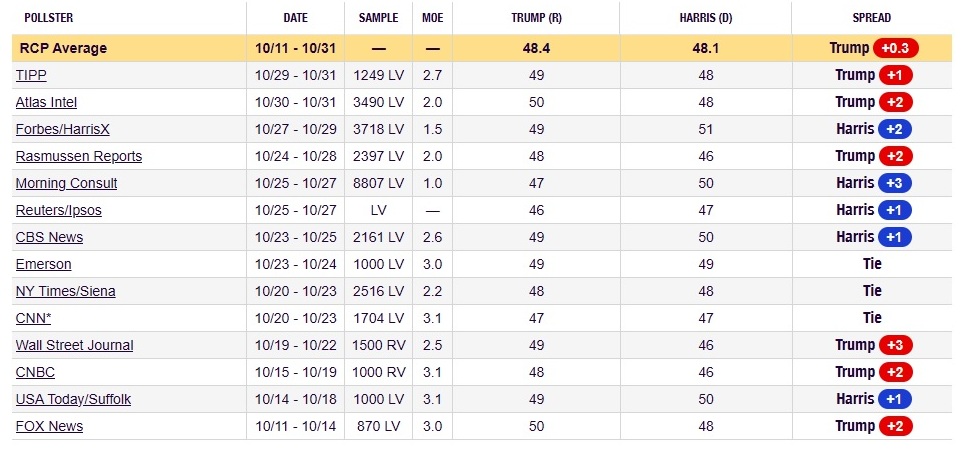| 4/15/2025: U.S. House District Analysis -- What Are "PVIs"? [RightDataUSA] | |||||||||||||||||||||||||||||||||||||||||||||||||||||||||||||||||||||||||||||||||||||||||||||||||||||||||||||||||||||||||||||||||||||||||||||||||||||||||||||||||||||||||||||||||||||||||||||||||||||||||||||||||||||||||||||||||||||||||||||||||||||||||||||||||||||||||||||||||||||||||||||||||||||||||||||||||||||||||||||||||||||||||||||||||||||||||||||||||||||||||||||||||||||||||||||||||||||||||||||||||||||||||||||||||||||||||||||||||||||||||||||||||||||||||||||||||||||||||||||||||||||||||||||||||||||||||||||||||||||||||||||||||||||||||||||||||||||||||||||||||||||||||||||||||||||||||||||||||||||||||||||||||||||||||||||||||||||||||||||||||||||||||||||||||||||||||||||||||||||||||||||||||||||||||||||||||||||||||||||||||||||||||||||||||||||||||||||||||||||||||||||||||||||||||||||||||||||||||||||||||||||||||||||||||||||||||||||||||||||||||||||||||||||||||||||||||||||||||||||||||||||||||||||||||||||||||||||||||||||||||||||||||||||||||||||||||||||||||||||||||||||||||||||||||||||||||||||||||||||||

Not all House districts are created equally, in partisan terms. Some are designed to elect Democrats, some are designed to elect Republicans, and a comparatively small handful could go either way. When U.S. House elections roll around, as a couple of special ones did in Florida earlier this month, there is a desire to quantify districts so that people can anticipate the outcomes. Does Candidate A have any chance at all against Candidate B? How close should the race be? Could there plausibly be an upset?
On April 1, Republican Jimmy Patronis won the special election in FL-1 by a margin of 14.6%; Republican Randy Fine won the special election in FL-6 by 14.0%. [The left-wing article had the FL-6 number wrong; it should have been R+14 and not R+7. You'd think they would want to be especially accurate here, in order to make their party's "moral victory" not appear to be such a small one.] So what is all this "R+" stuff? It's nomenclature created by political analyst Charlie Cook, for the purpose of evaluating House districts; Cook claims to have published the first such data in the late 1990s. His evaluations, which are known as PVIs, are considered to be the gold standard for district ratings. When you see how they are created, you may find yourself wondering why they hold such a lofty status. From Cook's website: "The Cook Partisan Voter Index measures how partisan a district or a state is compared to the nation as a whole. A Cook PVI score of D+2, for example, means that district performed an average of two points more Democratic than the nation did as a whole, while an R+4 means the district performed four points more Republican." These ratings are not merely measures of past performance; they are also imbued with predictive value and are used to answer questions about future elections in House districts, questions such as the ones in the opening paragraph of this commentary. A slightly more detailed explanation of the calculation comes from Wikipedia: "The [PVI] looks at how every congressional district voted in the past two presidential elections combined and compares it to the national average. The Cook PVI is displayed as a letter, a plus sign, and a number, with the letter indicating the party that outperformed in the district and the number showing how many percentage points above the national average it received." We emphasized part of that last sentence because the vast majority of people who throw around PVIs are clueless about the actual meaning of the numbers, and misinterpret them entirely. This misinterpretation is not of tremendous import as long as the numbers are merely being compared to each other, which after all is their primary purpose. In the above example FL-1 is obviously a more Republican-leaning district than FL-6. Even those who are mathematically-challenged are capable of understanding that 22 is a larger number than 7 (or even 14), though they have no idea -- or the wrong idea -- of what the "22" means or how that number was calculated. 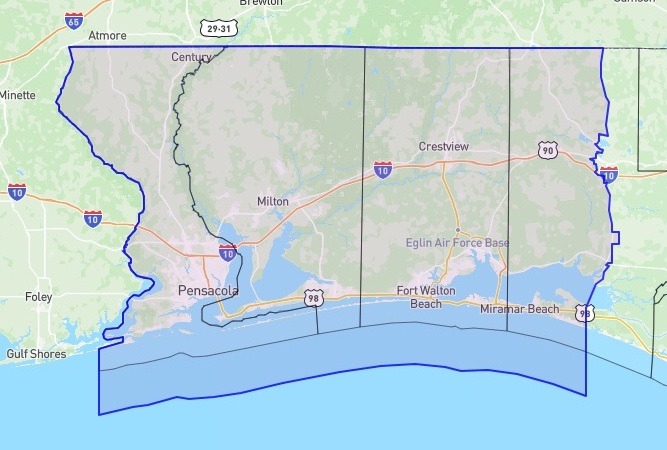
Florida congressional district 1
Let us illustrate. Both Republicans on April 1st won easily in their respective Florida special elections, however given the lean of their districts they appear to have underachieved. This enabled the media and other Democrats to claim hollow "moral" victories in the wake of Democrat defeats, because the GOP candidates did not obliterate their liberal rivals by as much as they were supposed to.
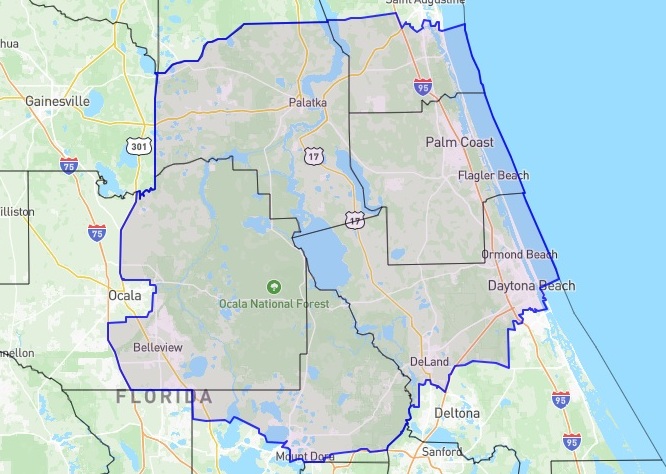
Florida congressional district 6
Randy Fine won FL-6 (PVI of R+14) by exactly 14 points, which sounds like a precisely typical result there. But R+14 does not mean the Republican should win by 14%; it means the Republican should win by 28%. So yeah, another "moral defeat" (LOL) for the GOP. Once again, this outcome is not a harbinger of future performance. In November of 2026 the GOP will win that district every bit as easily as it usually does, and Democrats will not be pissing $10 million of billionaires' money down the drain as they did a few weeks ago, no matter how easily they can afford to do so.
The Cook Political Report (CPR) has lately decided to charge a fee for up-to-date district ratings, which is a shame (for those who actually fork over cash) because their ratings are based on very limited data, and that data contains an overwhelming bias in the logical sense as opposed to the partisan sense. Anyone who has the time, the ability, and the underlying data can calculate PVIs that are not only free of charge, but which are more accurate if based on a wider range of relevant data. The Cook Political Report's current bias can be summarized as "All Republican candidates are Donald Trump". Does that sound like a good assumption to make? Democrat campaign coordinators and their media allies surely agree with Cook, but sensible folks would dispute his assertion. The CPR looks at two -- just two -- points of data for every congressional district in the country, and then anoints the districts with their sacred ratings based on that meager amount of data. The two data points are these, currently:
Astute observers will notice that the one and only Republican in this sample is Donald J. Trump. Thus, Cook is determining district ratings based solely on how much that district voted for or against President Trump. Does an affinity or a hatred for Trump all by itself determine exactly how other Republican candidates -- the ones in U.S. House races -- will fare in their specific districts? What kind of idiot would assume that it does? Below we provide the RightDataUSA.com PVI ratings, without any fee, for every U.S. House district in the country. Our ratings are likely to be similar but hardly identical to the "official" Cook PVIs (we don't know and we aren't paying to find out), because our ratings are based not only on the last two presidential elections but also on many other recent statewide elections. In the table, the "2024 Result" is the percentage which the victorious House candidate received in the November, 2024 election. 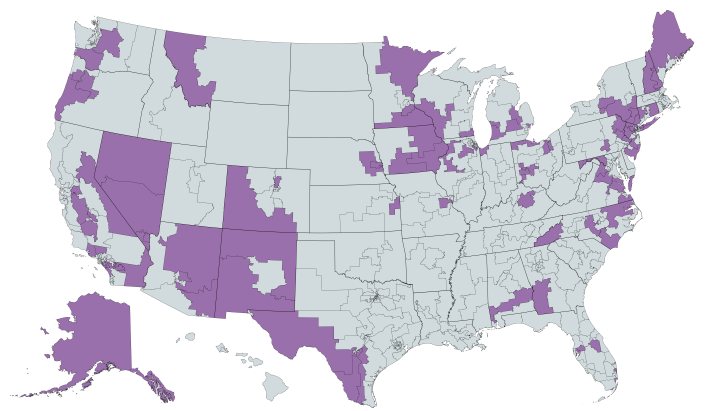
Map of 2026 battleground districts, created using mapchart.net
First, a note about the most competitive districts: Battleground districts are highlighted in the map above and in the table of all House districts which appears further down this page. It is unusual for a House member to win election in a district which tilts 6 points or more towards the opposite party although it does occasionally happen, so we define a "battleground" district as one in the range from D+5 through R+5. When upsets occur in House elections, they normally take place in these marginal districts, and therefore aren't truly "upsets".
In three cases above (CO-08, MI-07 and PA-07) the district is currently held by the "wrong" party -- the one which voters normally do not favor in statewide elections. You can bet that these three, plus other similar districts, are the ones which the national parties will have at the very top of their target lists in 2026. Those other similar districts are:
Based on the above lists, there is much more low-hanging fruit for Democrats to pick off in 2026 than there is for Republicans. Not to mention the two Republicans in already-marginal districts (Brian Steil, Derrick Van Orden) who are destined for extinction by the upcoming court-ordered Democrat gerrymander in Wisconsin. These are not the only districts which have a chance of flipping in 2026. In order to maintain control of the House, Republicans will need to hold on to a significant majority of their most vulnerable seats and perhaps achieve a small number of pickups of Democrat-held seats. They narrowly succeeded in 2024, but it will be more difficult in '26.
Update: Either we caught them on a good day or they've decided to drop the paywall for some reason, but the 2025 Cook PVI ratings are currently available even for non-subscribers! We still believe that more data means greater precision, but now readers can compare the two sets of ratings and decide for themselves. Tags:
PVI
Charlie Cook
U.S. House Ratings
More Data = More Accuracy
| |||||||||||||||||||||||||||||||||||||||||||||||||||||||||||||||||||||||||||||||||||||||||||||||||||||||||||||||||||||||||||||||||||||||||||||||||||||||||||||||||||||||||||||||||||||||||||||||||||||||||||||||||||||||||||||||||||||||||||||||||||||||||||||||||||||||||||||||||||||||||||||||||||||||||||||||||||||||||||||||||||||||||||||||||||||||||||||||||||||||||||||||||||||||||||||||||||||||||||||||||||||||||||||||||||||||||||||||||||||||||||||||||||||||||||||||||||||||||||||||||||||||||||||||||||||||||||||||||||||||||||||||||||||||||||||||||||||||||||||||||||||||||||||||||||||||||||||||||||||||||||||||||||||||||||||||||||||||||||||||||||||||||||||||||||||||||||||||||||||||||||||||||||||||||||||||||||||||||||||||||||||||||||||||||||||||||||||||||||||||||||||||||||||||||||||||||||||||||||||||||||||||||||||||||||||||||||||||||||||||||||||||||||||||||||||||||||||||||||||||||||||||||||||||||||||||||||||||||||||||||||||||||||||||||||||||||||||||||||||||||||||||||||||||||||||||||||||||||||||||
| 1/11/2025: 2024 Special Elections: Not So "Special" for Democrats After All [RightDataUSA] | |||||||||||||||||||||||||||||||||||||||||||||||||||||||||||||||||||||||||||||||||||||||||||||||||||||||||||||||||||||||||||||||||||||||||||||||||||||||||||||||||||||||||||||||||||||||||||||||||||||||||||||||||||||||||||||||||||||||||||||||||||||||||||||||||||||||||||||||||||||||||||||||||||||||||||||||||||||||||||||||||||||||||||||||||||||||||||||||||||||||||||||||||||||||||||||||||||||||||||||||||||||||||||||||||||||||||||||||||||||||||||||||||||||||||||||||||||||||||||||||||||||||||||||||||||||||||||||||||||||||||||||||||||||||||||||||||||||||||||||||||||||||||||||||||||||||||||||||||||||||||||||||||||||||||||||||||||||||||||||||||||||||||||||||||||||||||||||||||||||||||||||||||||||||||||||||||||||||||||||||||||||||||||||||||||||||||||||||||||||||||||||||||||||||||||||||||||||||||||||||||||||||||||||||||||||||||||||||||||||||||||||||||||||||||||||||||||||||||||||||||||||||||||||||||||||||||||||||||||||||||||||||||||||||||||||||||||||||||||||||||||||||||||||||||||||||||||||||||||||||
Prior to November in 2024 there was considerable wailing and pearl-clutching on the right (and gloating on the left) over the underperformance -- if not worse -- of Republican candidates in special elections at the congressional and state levels. 
Photo credit: abc7ny.com
It's true that Democrats did win the most important special election of them all. That took place in February in New York's 3rd congressional district, where ex-incumbent Thomas Suozzi (D) easily defeated newcomer Masi Melesa Pilip (R) in that D-leaning district. The election was held in order to select a replacement for freshman Republican George Santos, who was expelled from Congress in December, 2023. The impetus to oust Santos came not so much from Democrats, but mainly from Santos' own party and particularly his fellow Republican freshmen in the New York delegation. Those frightened frosh were fearful of Santos dragging them down with him in November, so they pre-emptively removed him and thought they had solved their problem.
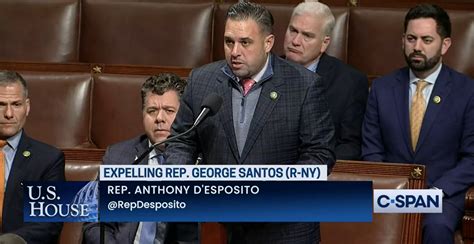
Photo credit: desposito.house.gov
They sure were, exactly as we predicted. In CD-22 Williams was victimized by a Democrat gerrymander which removed good areas of his marginal district and replaced them with bad ones; it didn't require a major change to the lines, just a little push further to the left was sufficient. In September, anti-Santos ringleader D'Esposito was accused by the liberal media of having an affair and then putting the woman on his payroll, but he was a dead man walking even before that. Molinaro went down in flames in CD-19 as well.
In another special election for Congress which took place in June, liberals cackled about Republican Michael Rulli's supposedly weak showing in Ohio's 6th congressional district, where he defeated a relatively penniless Democrat by "only" 9 points in a district which is typically much more GOP-leaning than that. We wrote about that outcome here and noted presciently that Rulli would have no trouble at all in the November rematch. He won by over 30 points. Special elections are often influenced heavily by organizational and motivational factors, and Republicans normally lack both of those in low-turnout elections which are little publicized on the right. Moving down to the state legislative level, in September, 2023 readers were scolded by some trembling GOP establishment blogger who calls himself "Bonchie" that Republicans had failed to learn from the numerous defeats of conservative candidates in 2022 and were still fielding bad (i.e. "conservative") candidates in special elections instead of nice, squishy, electable moderates. He specifically referenced New Hampshire where a conservative GOP nominee lost a 2023 special election in a microscopic state House (not congressional) district that was fraudulently described by the blogger as being solidly Republican. That Republican candidate, minister James Guzofski, did himself no favor by inviting the liberal media to portray him as a kook when he declared something like "Jesus told me that Donald Trump really won in 2020!", and the minister came out on the wrong end of a narrow decision in 2023. "Bonchie" concluded from this infinitesimal sample size that certain disaster awaited the GOP in the 2024 elections everywhere if they didn't heed his warning and run screaming to the left. Guzofski ran again in November, 2024 against the same Democrat who had defeated him in that 2023 special election where less than 3,000 people bothered to vote. This time Guzofski wasn't such a bad candidate after all -- over 50% of the voters chose him and Republicans swept all 3 state House seats in that New Hampshire district. In Florida a marginal state House district in the deteriorating Orlando area was vacated by an incumbent Republican, and the special election in January, 2024 went as expected: Democrat Tom Keen won by 2.6 points in a district which favors his party by about 2 points. As liberals were going bonkers about this "major upset" the massive GOP margin in the FL state House was merely reduced from 85-35 to 84-36. Hardly an occasion for panic, except for those who are easily rattled. What happened the next time a real election rolled around? Keen lost by nearly 4 points to Republican Erika Booth in this Democrat-leaning district, and once again those who had previously declared that the world was coming to an end were proven to be Chicken Littles. Another example: In a state House district which lies just north of Oklahoma City, liberals were outwardly cheerful despite yet another defeat because it was by a much closer margin than expected. Republican Erick Harris prevailed by only 5.3% in a February special election in a district that Democrats hadn't even contested since 2018. Nervous Nellies on the right got the vapors again. Democrats weren't fooled by the fluke outcome although they took the opportunity for some big talk. In November the Rats failed to come up with any nominee at all, and Harris trounced a Libertarian to easily hold the R+14 seat. The Rats never had a chance in this district, but acted as if they did and some idiots believed them. The lesson which should be learned here is -- most of the time, anyway -- there is nothing to be learned from low-turnout special elections, especially when they take place in puny little state House districts; and even more so when the balance of power won't be affected one iota no matter what the outcome is (like in Florida and Oklahoma). Occasionally special elections DO portend a future wave, as in 1993-94 when Republicans won U.S. House elections in places where they had never previously prevailed (like in OK-6 and KY-2) and came surprisingly close to winning in WI-1 which Democrats had held for a quarter-century at the time. Democrat Peter Barca almost lost in 1993 and did lose in 1994; the Rats have never won there again, nor have they ever won again in those Oklahoma and Kentucky districts. There will be 3 special elections to Congress coming up in the first few months of 2025: FL-1 (Matt Gaetz), FL-6 (Michael Waltz) and NY-21 (Elise Stefanik). These vacancies have occurred because the incumbents were nominated for positions in the second Trump administration, though Gaetz has since withdrawn. Each of these 3 districts are solidly Republican, and Democrats will not be winning any of them. But the liberal media will still be watching closely. When a Republican prevails easily, you'll never hear about it -- however if a Democrat does 0.1% better than expected it will be used as anti-Trump propaganda and described as a preview of a definite Republican bloodbath in the 2026 midterms. A bloodbath may in fact happen and the 2026 midterms may be similar to those of 2018, but that has nothing to do with these 3 elections. In all likelihood, what special elections in 2025 and 2026 will tell us about the future is. . . . nothing. Tags:
2024
House
Special (?) elections
| |||||||||||||||||||||||||||||||||||||||||||||||||||||||||||||||||||||||||||||||||||||||||||||||||||||||||||||||||||||||||||||||||||||||||||||||||||||||||||||||||||||||||||||||||||||||||||||||||||||||||||||||||||||||||||||||||||||||||||||||||||||||||||||||||||||||||||||||||||||||||||||||||||||||||||||||||||||||||||||||||||||||||||||||||||||||||||||||||||||||||||||||||||||||||||||||||||||||||||||||||||||||||||||||||||||||||||||||||||||||||||||||||||||||||||||||||||||||||||||||||||||||||||||||||||||||||||||||||||||||||||||||||||||||||||||||||||||||||||||||||||||||||||||||||||||||||||||||||||||||||||||||||||||||||||||||||||||||||||||||||||||||||||||||||||||||||||||||||||||||||||||||||||||||||||||||||||||||||||||||||||||||||||||||||||||||||||||||||||||||||||||||||||||||||||||||||||||||||||||||||||||||||||||||||||||||||||||||||||||||||||||||||||||||||||||||||||||||||||||||||||||||||||||||||||||||||||||||||||||||||||||||||||||||||||||||||||||||||||||||||||||||||||||||||||||||||||||||||||||||
| 11/6/2024: Congrats to President Trump! He Still Needs a House [RightDataUSA] | |||||||||||||||||||||||||||||||||||||||||||||||||||||||||||||||||||||||||||||||||||||||||||||||||||||||||||||||||||||||||||||||||||||||||||||||||||||||||||||||||||||||||||||||||||||||||||||||||||||||||||||||||||||||||||||||||||||||||||||||||||||||||||||||||||||||||||||||||||||||||||||||||||||||||||||||||||||||||||||||||||||||||||||||||||||||||||||||||||||||||||||||||||||||||||||||||||||||||||||||||||||||||||||||||||||||||||||||||||||||||||||||||||||||||||||||||||||||||||||||||||||||||||||||||||||||||||||||||||||||||||||||||||||||||||||||||||||||||||||||||||||||||||||||||||||||||||||||||||||||||||||||||||||||||||||||||||||||||||||||||||||||||||||||||||||||||||||||||||||||||||||||||||||||||||||||||||||||||||||||||||||||||||||||||||||||||||||||||||||||||||||||||||||||||||||||||||||||||||||||||||||||||||||||||||||||||||||||||||||||||||||||||||||||||||||||||||||||||||||||||||||||||||||||||||||||||||||||||||||||||||||||||||||||||||||||||||||||||||||||||||||||||||||||||||||||||||||||||||||||

November 5th was a wonderful night to be an American, and we get to begin enjoying the election results today!
Here are the districts which have been called and which have flipped from Democrat to Republican:
These initial districts flipped almost solely due to the effects of redistricting. In Alabama and Louisiana, racist court rulings mandated the ouster of White Republicans from the House and the substitution of black Democrats. In New York, Democrats belatedly gerrymandered the state earlier in 2024, but NY-22 was likely to be lost even without that factor. In North Carolina, an illegal Democrat gerrymander which had been in place in 2020 and 2022 was finally removed and replaced by a legitimate district map. The Michigan district was an open seat which was formerly held by Democrat Elissa Slotkin, who left to run for the Senate (and probably win, but that's not been called yet). Here are the other potential pickups for Republicans:
At one point on 11/6 DD saw a possible R+2 outcome in the House; they are predicting R-1 as of the evening of 11/8 and have been sticking to that number ever since. R-1 means they keep control, 220-215. Update 11/9: DD shows 11 House races uncalled and the GOP needs only to win 2 to maintain control; DD believes they will win 4 of the 11. Evans (R) is now ahead of Caraveo (D) in CO-8; Ciscomani (R) is clinging to life in AZ-6 and Begich (R) is ahead but still short of the necessary 50% in AK. All other undecided seats are in CA and Republicans lead in some of those too. Update 11/10: Golden may not win in ME-2 after all -- with all ballots counted he has fallen below 50% and therefore the race will be decided by Rigged Choice Voting just like it was in 2018 when that scheme was first used in Maine. Golden is still likely to win, but apparently not 100% certain at this point. Update 11/11: Most media called it on Sunday but now everybody says that Republicans have picked up CO-8. AZ-6 is still too close to call and they're all asleep in Alaska, where vote totals haven't moved in a long time. Republican incumbents will probably lose no more than 2 seats in CA (we hope) and there will be no pickups there, but in the end the House should stay (R). Update 11/12: It's over (as far as who will run the House) -- Republicans hold CA-41 and AZ-6 but lose CA-27. A net of minus-1 there may not sound impressive, and it's not, but it is sufficient to reach the 218 threshold; they are at 219 with possibly 2 more wins yet to come (AK and CA-13). If those wins materialize we'll wind up exactly where we started, with Republicans having a 221-214 advantage. That outcome may also sound unimpressive, but given the number of marginal districts which had to be defended, merely breaking even isn't bad at all and a slightly better outcome than realists like us projected for them. So far Trump has named 2 incumbent GOP House members to his administration, which will necessitate special elections in FL-6 (Waltz) and NY-21 (Stefanik). Those special elections should be easy wins for the Republicans. Final update: In mid-December the GOP lost the last 2 House elections to be called, both of them in California, and both in districts where Republican incumbents had been leading for over a month. Democrats were able to "harvest" enough ballots to put their candidates over the top just before time expired. The final count then is 220-215, a net loss of 1 seat for the GOP -- slightly better than we expected (-2 or a little worse) but far worse than the conventional "wisdom" which desperately envisioned House gains to go along with a presidential win. Tags:
2024
House?
We'll find out in December
| |||||||||||||||||||||||||||||||||||||||||||||||||||||||||||||||||||||||||||||||||||||||||||||||||||||||||||||||||||||||||||||||||||||||||||||||||||||||||||||||||||||||||||||||||||||||||||||||||||||||||||||||||||||||||||||||||||||||||||||||||||||||||||||||||||||||||||||||||||||||||||||||||||||||||||||||||||||||||||||||||||||||||||||||||||||||||||||||||||||||||||||||||||||||||||||||||||||||||||||||||||||||||||||||||||||||||||||||||||||||||||||||||||||||||||||||||||||||||||||||||||||||||||||||||||||||||||||||||||||||||||||||||||||||||||||||||||||||||||||||||||||||||||||||||||||||||||||||||||||||||||||||||||||||||||||||||||||||||||||||||||||||||||||||||||||||||||||||||||||||||||||||||||||||||||||||||||||||||||||||||||||||||||||||||||||||||||||||||||||||||||||||||||||||||||||||||||||||||||||||||||||||||||||||||||||||||||||||||||||||||||||||||||||||||||||||||||||||||||||||||||||||||||||||||||||||||||||||||||||||||||||||||||||||||||||||||||||||||||||||||||||||||||||||||||||||||||||||||||||||
| 11/2/2024: Election 2024: The Final Hours [RightDataUSA] | |||||||||||||||||||||||||||||||||||||||||||||||||||||||||||||||||||||||||||||||||||||||||||||||||||||||||||||||||||||||||||||||||||||||||||||||||||||||||||||||||||||||||||||||||||||||||||||||||||||||||||||||||||||||||||||||||||||||||||||||||||||||||||||||||||||||||||||||||||||||||||||||||||||||||||||||||||||||||||||||||||||||||||||||||||||||||||||||||||||||||||||||||||||||||||||||||||||||||||||||||||||||||||||||||||||||||||||||||||||||||||||||||||||||||||||||||||||||||||||||||||||||||||||||||||||||||||||||||||||||||||||||||||||||||||||||||||||||||||||||||||||||||||||||||||||||||||||||||||||||||||||||||||||||||||||||||||||||||||||||||||||||||||||||||||||||||||||||||||||||||||||||||||||||||||||||||||||||||||||||||||||||||||||||||||||||||||||||||||||||||||||||||||||||||||||||||||||||||||||||||||||||||||||||||||||||||||||||||||||||||||||||||||||||||||||||||||||||||||||||||||||||||||||||||||||||||||||||||||||||||||||||||||||||||||||||||||||||||||||||||||||||||||||||||||||||||||||||||||||||

Photo credit: CNN
With just a few more hours until the 2024 election campaign season mercifully concludes, we are on track for one of the closest elections in U.S. presidential history if the polls can be believed. But some folks are not so sure about that, and are thinking in terms of "waves" and "landslides" that will deliver not just the White House but also the U.S. House and Senate. For example (just from the past few days):
But also:
These polar-opposite worldviews are hardly unexpected; the fragile snowflakes on both sides (there are far more on the left, but no shortage on the right either) need to be constantly reassured that things are going their way, no matter what "lies" they may hear which say otherwise. Pay no attention to the man behind the curtain and believe everything we tell you, they say. Well, somebody is lying, and somebody is going to be crushingly disappointed on November 6th or whenever the vote-counting finally ceases. 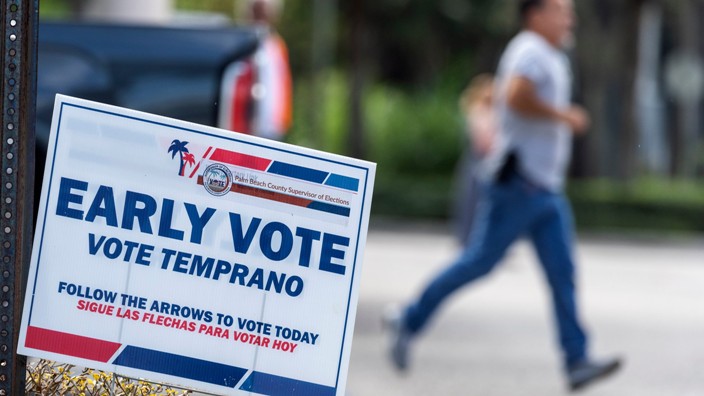
Photo credit: Palm Beach Post
Early Voting
In a nation as closely divided as this one, it appears that the potential for a "wave" that would sweep over the presidency, the Senate and the House is minimal. But it's not impossible. We'll say this much: if there is any kind of wave, it's probably going to be the kind we don't want to see. Republicans routinely underestimate the amount of hatred Democrats are capable of, and hatred is an excellent motivation for voting. 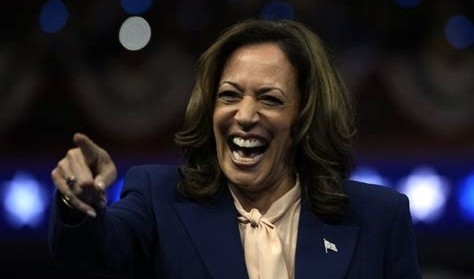
Photo credit: Twitchy.com
The 2024 Presidential Election:
If this series of miniscule margins that generally favor Donald Trump -- ALL of which are within the margin of sampling error -- carry over to the actual vote counts, then Trump will prevail in the Electoral College by the count of 287 to 251 assuming all other states go as expected. Which means that the "Keystone" to the election is the state of Pennsylvania -- as we noted long ago and wrote about in considerable detail; it is tremendously likely that whoever wins PA wins the election. There are a couple of things to keep in mind about all of these pollsters who are showing exceedingly close races in several states at the presidential level, and in other races as well:
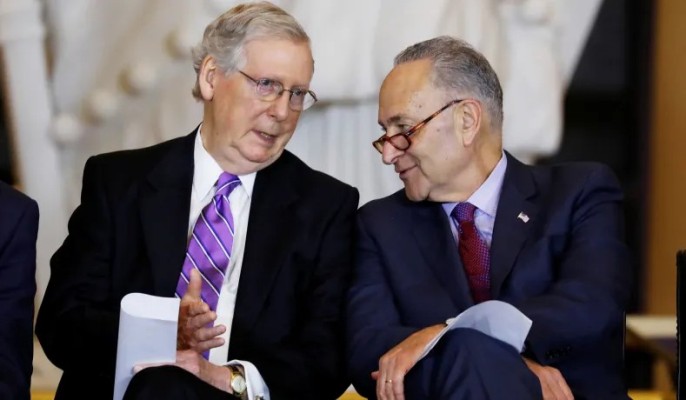
Photo credit: National Review
The Senate:
The potential bad news comes from Florida, Texas and even rock-solid crimson, burgundy, maroon Nebraska, where an "independent" phony-moderate candidate is supposedly within striking distance of squishy Republican incumbent Deb Fischer according to the far-left New York Times and the liberal candidate's own polls; all other polls forecast a normal Nebraska outcome. The Democrats did not even field a candidate here -- aside from the one who is calling himself an independent. Republicans are likely to hold all three of those seats. The Rats are flooding Florida and Texas with $$$ but it would still be quite an upset if Ted Cruz or Rick Scott were to lose; some now classify the TX race as a tossup. The saving grace for these two Republicans could be the laughably poor quality of their liberal Democrat opponents. But the usual Democrat formula of (money + lies + hate) = victory certainly could work. There's one important ingredient we left out of that equation, which helps Democrats greatly when money + lies + hate isn't quite sufficient. That ingredient is normally not added until after the votes are cast. 
Photo credit: The Hill
It's not necessarily about voters actually supporting the dim-bulb Democrats in FL & TX; it's more about voting against the Republicans. Neither Scott nor Cruz are popular with anything more than the tiniest majority of the electorate in their states. Trump is going to win Florida and Texas and even though casual observers will be surprised to hear that a coattail effect might be required for Scott and Cruz, that very well may be the case. We'll say they both pull it out in the end.
There are also lunatic fringe pipe dreams regarding Republican pickups in Maryland and Virginia. However the GOP has zero chance in Maryland and at most a 10% chance in the Virginia Senate race. But those other six states are going to be close, to one degree or another. Ohio and Wisconsin are the most likely pickups; Arizona (one outlier poll aside) and Nevada are the least likely. Pennsylvania and Michigan currently look improbable too. In any event, this is all gravy for the Republicans. They have nothing to lose in these states and everything to gain. The probability, however, is that they will gain nothing, or at most one. But it would take only a very slight shift to the right, and suddenly it could be another +2! Or more! All Senate polls are close in these marginal states and, on average, they all show the Republican losing. Final score: The most likely outcome is a net gain of 2 or perhaps 3 seats for the GOP, which means the breakdown will be 51-49 or 52-48 in the Republicans' favor starting in 2025. It may be assumed that any "wave", however low the probability is that one occurs, can only push things further in the Republican direction. But don't completely discount the possibility of an unpleasant surprise in Texas or Florida. Worst case scenario: the Senate stays 51-49 Democrat, and that is not terribly likely. 
Photo credit: Fox News
As far as the likely outcome: as we have noted on numerous occasions, having only 51 or 52 seats is not satisfactory to give the GOP anything but nominal control. There are at least two Republican senators -- Lisa Murkowski (Alaska) and Susan Collins (Maine) -- who are for all intents and purposes Democrats. They can continue to sabotage GOP efforts from within as the leadership would prefer; they can drop the charade and become Democrats; or they can go the "independent" route. Regardless, GOP "control" of the Senate will be largely illusory in every way aside from perhaps mathematics.

Current U.S. House breakdown by district (Map created using mapchart.net)
The House:
Democrats could get the +4 they need in New York and California alone. Republican freshmen (and some incumbents) won numerous close -- fluke -- elections in 2022 and a large portion of those outcomes are highly likely to be reversed. One already has been reversed (NY-3, Santos) in a special election. There are as many as five vulnerable GOP freshmen in New York. Two of the five (Brandon Williams, Anthony D'Esposito) appear to be near-certain losses. Two others (Marc Molinaro, Mike Lawler) are tossups at best. Numerous Republicans are on the hot seat in the Land of Fruits and Nuts. Endangered incumbents include John Duarte, David Valadao, Mike Garcia, Michelle Steele and Ken Calvert. It will be no surprise if at least two or three of those lose. Don't bother staying up late on election night to find out. California gives itself 30 days to count votes in order to facilitate "ballot harvesting" after election day. Thirty days apparently wasn't enough time for California Democrats in 2022; don't expect the same results in 2024. Unless an endangered California incumbent is solidly ahead prior to Ballot Harvesting Month, then he/she doesn't have much of a prayer of remaining in Congress. Republicans will pick up 3 seats in North Carolina due to the removal of the 2020/2022 illegal Democrat gerrymander. Republicans will lose 2 seats (one in Alabama, one in Louisiana) due to the impact of racist court rulings which have demanded that a White Republican be replaced by a black Democrat in both instances. Elsewhere, the list of likely ("likely" = "maybe a 50.1% chance" so don't get too excited) GOP pickups is a short one:
The list of likely GOP losses is longer, even without including the five endangered Californians:
Neither of these lists is exhaustive. For a wider range of possible House flips, read our report from a couple weeks ago. If there is any kind of movement off-center, one list or the other will expand. Based on all of the above expectations, the final outcome in the House is going to be exceedingly close. Republicans will need at least a small swing to the right in many districts in order to simply retain what they already possess; that swing is hardly a certainty. The likeliest outcome is that the GOP suffers a net loss of 2 to 8 seats. The results from 2022 in California and New York are what gave the Republicans the House during this past term; the results from those states in 2024 will be the ones which are primarily responsible for giving Democrats control beginning in 2025, if the House does in fact flip. State legislatures: Nearly all states are having legislative elections this year. Those elections are well under the radar as compared to the U.S. House, Senate and presidency, but they are hardly unimportant. In most places, partisan control of a state House or state Senate is not in much doubt. However there are a handful of states -- many of the same ones which are tossups at other levels too -- in which control of a state legislative body could easily flip from one party to the other. The ones that are most flippable include: Alaska: Both the House and especially the Senate are close, but it almost doesn't matter because even when the GOP has the numbers (as they always do) the liberal-RINO wing of the party conspires with liberal Democrats to form a "coalition" which ensures that conservative legislators are on the outside, and powerless. The House currently consists of 21 R, 13 D and 6 independents; the Senate has 11 R and 9 D -- with 8 Republicans and all 9 Democrats working together to seize control and exclude three conservative Republicans. Arizona: The Rats need ONE House seat (there are 31 R and 29 D) and ONE Senate seat (16 R, 14 D) to move from minority status into a tie. Obviously that means they need +2 to take full control of the state government. Michigan: Dems flipped both houses in 2022. Michigan Republicans are in an identical position to Arizona Democrats: +1 to tie, +2 to win. The House is 56 D, 54 R; the Senate is 20 D, 18 R. Neither Arizona nor Michigan are exactly known for election integrity lately, so temper your expectations accordingly. Minnesota: Republicans need a net gain of 1 seat in the Senate (34 D, 33 R) to win back what they lost control of in 2022. It will take a small wave (R+4) to get the House. New Hampshire: In a state where practically every neighborhood has its own representative (there are 400 seats in the House of this tiny state) things often fluctuate wildly. If they fluctuate just slightly to the left, Rats will get the House. The current breakdown is 201 R, 196 D, 3 I. Republicans have nominal control of the state Senate (14 R, 10 D). Pennsylvania: Could cause the fragile types to ingest a ton of copium next week if Cackles wins, Casey is re-elected, Perry loses, etc. Then add the Democrats going +3 and taking the state Senate (current breakdown: 28 R, 22 D) and by doing so seizing 100% control of PA government. The GOP is fighting hard and may avert disaster, at least in the state Senate. The Rats currently lead 102-101 in the state House and on a good election night the Republicans will take it back. On a bad night they won't. Wisconsin: The GOP has large majorities in both houses of the legislature.... today. In 2025, they won't. A Democrat gerrymander has been put in place for 2024 and when the votes are counted the Wisconsin House and Senate are going to look a lot like Pennsylvania's or Michigan's -- tossups all the way around. The Wisconsin GOP needs a good election night at all levels. Currently the splits are 22 R, 11 D in the Senate and 64 R, 35 D in the House. Enjoy it while you still can, Wisconsin Republicans. Tags:
2024
House
Senate
Presidency
Hope we're wrong about the House
| |||||||||||||||||||||||||||||||||||||||||||||||||||||||||||||||||||||||||||||||||||||||||||||||||||||||||||||||||||||||||||||||||||||||||||||||||||||||||||||||||||||||||||||||||||||||||||||||||||||||||||||||||||||||||||||||||||||||||||||||||||||||||||||||||||||||||||||||||||||||||||||||||||||||||||||||||||||||||||||||||||||||||||||||||||||||||||||||||||||||||||||||||||||||||||||||||||||||||||||||||||||||||||||||||||||||||||||||||||||||||||||||||||||||||||||||||||||||||||||||||||||||||||||||||||||||||||||||||||||||||||||||||||||||||||||||||||||||||||||||||||||||||||||||||||||||||||||||||||||||||||||||||||||||||||||||||||||||||||||||||||||||||||||||||||||||||||||||||||||||||||||||||||||||||||||||||||||||||||||||||||||||||||||||||||||||||||||||||||||||||||||||||||||||||||||||||||||||||||||||||||||||||||||||||||||||||||||||||||||||||||||||||||||||||||||||||||||||||||||||||||||||||||||||||||||||||||||||||||||||||||||||||||||||||||||||||||||||||||||||||||||||||||||||||||||||||||||||||||||||
| 10/17/2024: 2024 Election Analysis: Will Republicans Hold the House? [RightDataUSA] | |||||||||||||||||||||||||||||||||||||||||||||||||||||||||||||||||||||||||||||||||||||||||||||||||||||||||||||||||||||||||||||||||||||||||||||||||||||||||||||||||||||||||||||||||||||||||||||||||||||||||||||||||||||||||||||||||||||||||||||||||||||||||||||||||||||||||||||||||||||||||||||||||||||||||||||||||||||||||||||||||||||||||||||||||||||||||||||||||||||||||||||||||||||||||||||||||||||||||||||||||||||||||||||||||||||||||||||||||||||||||||||||||||||||||||||||||||||||||||||||||||||||||||||||||||||||||||||||||||||||||||||||||||||||||||||||||||||||||||||||||||||||||||||||||||||||||||||||||||||||||||||||||||||||||||||||||||||||||||||||||||||||||||||||||||||||||||||||||||||||||||||||||||||||||||||||||||||||||||||||||||||||||||||||||||||||||||||||||||||||||||||||||||||||||||||||||||||||||||||||||||||||||||||||||||||||||||||||||||||||||||||||||||||||||||||||||||||||||||||||||||||||||||||||||||||||||||||||||||||||||||||||||||||||||||||||||||||||||||||||||||||||||||||||||||||||||||||||||||||||

Current U.S. House breakdown by district (Map created using mapchart.net)
1. Competitiveness
That last one is a biggie, but the others are also important. Regarding the suitability of the candidates: Democrats always try to run the most liberal candidates possible in House races, but in a marginal district they must (with the help of their army of media allies) attempt to disguise their nominee as a "moderate" because they understand that most voters in a marginal district would find an in-your-face liberal nutbucket to be repugnant. Once elected, Democrat "moderates" normally march in goose-step with their liberal colleagues. Even when narrowly in the minority as is the case today in the House, Democrats voting as a united bloc is nearly always sufficient to thwart any unwanted legislation. This happens because there are always enough liberal Republicans in the party's "big tent" to cross over and assist the Democrats whenever the Republican establishment (GOPe) desires for that to occur. Sometimes, particularly on legislation which has no chance of passing the Senate or being signed into law, the Democrat puppetmasters will permit their most vulnerable House members to temporarily leave the plantation and cast a non-liberal vote. Which they can then highlight to the voters back home as a sign of their alleged "independence" when re-election time rolls around. Of course there is no real independence; they vote as they are told to -- always. Those who control the Republican party (and especially its purse strings) also seek to run the most liberal candidates possible in House races -- even in solid Republican districts -- because the GOPe finds anyone who is even remotely conservative to be repugnant. On this topic, the leadership of both parties are in agreement. Occasionally, the GOPe is correct in running a moderate-liberal if the nature of the district is inappropriate for a nominee who is perceived as being too far to the right. Based on the above criteria, we have identified 62 districts which should be competitive this year. This list is not substantially different from the one we published over a year and a half ago, but the data associated with these districts is now up-to-date. In addition to the potential flippers, there's also one district in Washington which features two Republicans and zero Democrats running; the incumbent Republican is a Trump-hating impeachment RINO while the challenger is a solid conservative. If an upset should occur there it won't count as a GOP pickup since they already hold that seat, but it would be a welcome development nonetheless. 2. Background After the 2022 elections, Republicans controlled the House by the margin of 222-213. Since that time there have been 8 special elections held to replace representatives who retired or died. Seven of those 8 were won by the same party which originally held the seat. The lone exception occurred in New York in February when Democrats won the special election in NY-3 to replace conservative Republican George ("Miss Me Yet?") Santos. That election was necessitated when the Stupid Party decided to expel Santos from Congress in December, 2023 for allegedly being so corrupt that he might as well have been a Democrat. But he voted like a conservative which, come to think of it, probably didn't help his case with the party leadership. The have been three other resignations or deaths for which special elections have not yet been held (or will not be held), and the GOP currently has a 220-212 advantage in the House. Because two of the three vacancies exist in solid Democrat districts (NJ-9, TX-18) which will be easily retained in November, the Democrats effectively have 214 seats going into the election which means they require a net gain of merely 4 seats to seize control. 3. Belated Redistricting Congressional redistricting -- the redrawing of U.S. House district lines -- took place in all states prior to the 2022 elections, except of course in the six (Alaska, Delaware, North Dakota, South Dakota, Vermont and Wyoming) which have only one district that comprises the entire state and therefore there are no district lines. After 2022 however, a handful of states redrew their districts. This will have a net effect of close to zero on the partisan composition of Congress in 2025, but will result in significant changes within the affected states. In North Carolina the Democrat-controlled state Supreme Court in 2020 (and then again in 2022) chose to illegally bypass the Republican-controlled legislature and mandated district lines which favored Democrats. In 2022 the voters of the Tarheel State delivered a GOP majority to the Court. The Court then began acting lawfully and returned the task of line-drawing to the legislature, where it belongs. As a result, Republicans will almost certainly be picking up three House seats (NC-6, NC-13, NC-14) from Democrats on election day. However this windfall will be negated by redistricting-related outcomes in Alabama, Louisiana and New York. In the two southern states, partisan Democrat judges demanded that two conservative White Republicans (one in Alabama, one in Louisiana) be replaced in the House by two liberal black Democrats. Barry Moore (AL-2) and Garret Graves (LA-6) are the two Republicans who will be out of work after 2024 because of these racist court rulings. In New York, Democrats in 2022 were forced to settle for a district map that was only a slight improvement over the one from which they had benefitted in 2020; they had tried for a hyper-partisan gerrymander which would have all but eliminated Republicans (it would have been something like 22 Democrats and just 4 Republicans) from the New York congressional delegation. In March of 2024, New York Democrats tried once again to gerrymander the state's congressional districts in their favor, and they succeeded without any resistance from the GOP. We wrote about this in detail at the time it occurred. Having already picked up NY-3 in the Santos debacle, NY Democrats ensured that their pickup would not revert to the GOP in November (and it won't). Additionally, they have altered the Syracuse-Utica area district of freshman Republican Brandon Williams to severely endanger him, making it all but certain for the Democrats to go +1 in New York. At least +1. Redistricting greatly altered no other New York districts, though it did make NY-18 a little safer for liberal freshman Democrat Pat Ryan. However it always was probable that New York and California would be bloodbaths for the Republicans in 2024. That logical assertion is based on the sheer number of close (fluke) House wins which the GOP somehow achieved in those liberal states in 2022, and many close/fluke outcomes were likely to be reversed in 2024 with or without the assistance of Democrat gerrymandering. One other state -- Georgia -- redrew its lines after 2022 by a court order similar to the one which affected Alabama and Louisiana. Democrats have been fuming ever since that ruling came down because Republicans found a way to comply with the racist ruling without sacrificing any of their currently-held seats. We also wrote about that in detail at the time it occurred. Even counting New York at only -1 for the Republicans, that, along with the -2 which is guaranteed from Alabama and Louisiana means a break-even as the result of belated redistricting despite the upcoming GOP bonanza in North Carolina. 4. The 62 Most-Flippable Districts These do not include the North Carolina, Alabama and Louisiana districts already mentioned above, but does include NY-22 (Williams) because it is not quite 100% certain that the district will be won by a Democrat. The following 62 districts are the ones which should be strongly sought by both parties -- but it doesn't work out that way in all cases, as we will illustrate. Several of the listed districts, mostly ones held by Democrats, are not very likely to flip despite the vulnerability of the Democrat incumbents. Or at least not nearly as likely as they should be, mainly because the GOP does not have infinite funds to work with, while the Democrats (via their "ActBlue" money laundry) apparently do. Some are finally beginning to catch on to the illegal activities of ActBlue, but it's too late to do anything about it in this election cycle and Democrats are likely to be able to purchase a significant number of House and Senate seats which might otherwise be far more tenuous. Here are the 62 most likely potential flippers, by region. The bloodiest battlegrounds are highlighted, and some which probably won't be so bloody come with brief explanations. Northeast (16):
Mid-Atlantic (3):
South (2):
Midwest (13):
Great Plains-Mountain West (8):
West (20):
As noted above, the most competitive districts are bolded. A little more (34) than half of the listed districts fit that description. Of these 34, 11 are currently held by Democrats and 23 by Republicans. That's not a good ratio. There are some others which are perhaps a small amount behind in terms of competitiveness. They are:
Three of those are currently GOP districts and three are held by Democrats. Add them to the 34 super-contested districts and the Republicans have the potential to lose 26 marginal seats, the Democrats 14. The 40 most competitive districts are mostly in states which are toss-ups at the presidential level (AZ, MI, NC, NV, PA, WI) or ones which the bumbling Word Salad Queen is guaranteed to win (CA, CO, NE*, NJ, NM, NY, OR, VA, WA). Only six of the 40 battleground districts lie in states that Trump should win (AK, IA, ME*, MT, TX). Eleven lie in the swing states and 23 are in states where Trump's probability of victory ranges from "very unlikely" to "utterly impossible". If there is any presidential coattail effect in that latter group, it is hardly going to be beneficial for GOP House candidates. [* ME-2 and NE-2 are in states which split electoral votes. Trump is likely to win ME-2 and lose NE-2, replicating the 2020 outcome in those two districts.] In these 40 districts, Democrats have raised more money in 30 of them and have spent more money in 30 of them. Republicans have the financial edge in only 10 of the 40. As we've stated several times before: there is no election in this country, at any level, in which Democrats cannot outspend Republicans (often by astronomical amounts) if they wish to do so. Money alone doesn't determine the outcome of an election, but having more than your opponent surely doesn't hurt. The results in the other districts listed above are not likely to be as close as they should be. Republicans are not trying as hard as they might in R-leaning districts like KS-3, OH-9, OH-13 and PA-7. They are also not terribly competitive in some districts which lean only slightly to the left (in the D+1 to D+4 range) such as IL-17, MD-6, MI-3, MN-2, NV-3, NV-4, OH-1, PA-17 and TX-28. These represent blown opportunities, although if a "red" wave somehow materializes there may be some pleasant surprises here. There are about a dozen districts which have not been mentioned previously but could change partisan hands in November; it would require moderate to major upsets in order to wind up doing so. Some of these are really just pipe dreams for one party or the other, and the majority of them are not even being seriously contested (financially) although some are. We enumerate them just to cover all the bases:
5. Conclusion Add it all up and the probability of the GOP remaining in charge of the House appears to be less than 50% (perhaps much less), barring a clear shift to the right between now and November 5. As we have documented, there are likely to be more tight races in Republican-held districts than there will be in Democrat-held ones. Anything can happen in a close election, in case you've somehow forgotten 2020. Even if the GOP wins as many as half of the most precarious 40 districts, which is by no means certain to happen, that would make it +6 for the Democrats and 220-215 control of the House. When Democrats rule a legislative body by even one seat, they govern with an iron fist as if they have 100% control; when Republicans face the same margins -- as they currently have in the House and will in the Senate next year -- they become even more timid than usual (they aren't really comfortable with the concept of "governing") and act as if they have control of nothing. Which, in effect, they don't. And good luck with Senate "control" anyway with traitors like Lisa Murkowski, Susan Collins and Lindsey Graham in the GOP caucus -- assuming that none of them switch parties after 2024. The difference between how the parties behave in advantageous situations will be quite evident beginning in January, unless the Republicans can stem the tide of potential House losses and cling to power, such as it is with a twerp like Mike Johnson in command. As spineless as the GOP leadership is, that party's control of the House at least means that the Trump agenda (assuming he wins the presidency) is not immediately D.O.A. as it would be under racist election-denying Speaker Hakeem Homeboy, and it also means we would avoid a never-ending series of Trump impeachments. Vote hard. Tags:
2024
House
"Red" wave in the House?
Not likely
| |||||||||||||||||||||||||||||||||||||||||||||||||||||||||||||||||||||||||||||||||||||||||||||||||||||||||||||||||||||||||||||||||||||||||||||||||||||||||||||||||||||||||||||||||||||||||||||||||||||||||||||||||||||||||||||||||||||||||||||||||||||||||||||||||||||||||||||||||||||||||||||||||||||||||||||||||||||||||||||||||||||||||||||||||||||||||||||||||||||||||||||||||||||||||||||||||||||||||||||||||||||||||||||||||||||||||||||||||||||||||||||||||||||||||||||||||||||||||||||||||||||||||||||||||||||||||||||||||||||||||||||||||||||||||||||||||||||||||||||||||||||||||||||||||||||||||||||||||||||||||||||||||||||||||||||||||||||||||||||||||||||||||||||||||||||||||||||||||||||||||||||||||||||||||||||||||||||||||||||||||||||||||||||||||||||||||||||||||||||||||||||||||||||||||||||||||||||||||||||||||||||||||||||||||||||||||||||||||||||||||||||||||||||||||||||||||||||||||||||||||||||||||||||||||||||||||||||||||||||||||||||||||||||||||||||||||||||||||||||||||||||||||||||||||||||||||||||||||||||||
| 9/14/2024: Senate's most vulnerable list still dominated by Democrats [Roll Call] | |||||||||||||||||||||||||||||||||||||||||||||||||||||||||||||||||||||||||||||||||||||||||||||||||||||||||||||||||||||||||||||||||||||||||||||||||||||||||||||||||||||||||||||||||||||||||||||||||||||||||||||||||||||||||||||||||||||||||||||||||||||||||||||||||||||||||||||||||||||||||||||||||||||||||||||||||||||||||||||||||||||||||||||||||||||||||||||||||||||||||||||||||||||||||||||||||||||||||||||||||||||||||||||||||||||||||||||||||||||||||||||||||||||||||||||||||||||||||||||||||||||||||||||||||||||||||||||||||||||||||||||||||||||||||||||||||||||||||||||||||||||||||||||||||||||||||||||||||||||||||||||||||||||||||||||||||||||||||||||||||||||||||||||||||||||||||||||||||||||||||||||||||||||||||||||||||||||||||||||||||||||||||||||||||||||||||||||||||||||||||||||||||||||||||||||||||||||||||||||||||||||||||||||||||||||||||||||||||||||||||||||||||||||||||||||||||||||||||||||||||||||||||||||||||||||||||||||||||||||||||||||||||||||||||||||||||||||||||||||||||||||||||||||||||||||||||||||||||||||||

Photo credit: Tom Williams/CQ Roll Call
The caption at rollcall.com which accompanies the above photo describes Senator Bob Casey, Jr. (D-PA) and his wife as they "celebrate on the final night of the Democratic National Convention". That's one grim-looking "celebration". It seems they aren't feeling the "joy" which, as you surely know by now, is one of the laughable emotional buzzwords that has been assigned to Queen Kamala's campaign by the gaslighting liberal media. It looks more like the Caseys are feeling a bit of constipation, and there's some chance they may get that sensation again in November, whenever Pennsylvania finally decides to stop vote-counting.

Photo credit: CNN
1. West Virginia

Photo credit: Fox News
2. Montana

Photo credit: AP News
At long last it appears that Tester's appeal has diminished to the point where he is in serious trouble. He may be in trouble in the polls, where surveys lately show Sheehy ahead by about 5 points, but if money alone determined the election outcome Tester would be winning in a landslide. As of the latest FEC filings, Tester has spent over $33 million as opposed to just over $10 million for Sheehy. As we have mentioned here on numerous occasions, there's not a House district or Senate seat in the U.S. where Democrats can't outspend Republicans by incredible margins if they want to. This will be proven to be true in almost every single hotly-contested Senate and House race in 2024.

Photo credit: 10TV
3. Ohio

Photo credit: WCPO
The 2022 Republican nominee, J.D. Vance, was (and still is) unacceptably conservative according to the wimpy wing of the Republican party, he had some trouble raising money and seemed to be off the air for long periods in the summer while Ryan was on the attack 24/7. Smelling blood in the water and sensing an unexpected pickup opportunity, Democrats flooded the state with oodles of cash and Ryan was able to outspend Vance by the margin of $57 million to $15 million. After trailing most of the time, finally in October Vance consistently pulled ahead in the polls and then won in November, but it was uncomfortably close in supposedly "dark red" Ohio.

Photo credit: Ohio Star
The 2024 Republican nominee, Bernie Moreno, is unacceptably conservative according to the wimpy wing of the Republican party, he has had some trouble raising money and seemed to be off the air for long periods in the summer while Brown was on the attack 24/7. Democrats flooded the state with oodles of cash and Brown has so far been able to outspend Moreno by the margin of $43 million to $11 million. After trailing the entire time, finally in September Moreno appears to be closing the gap in the polls, but has yet to be shown in the lead in any poll. Will "dark red" Ohio come through for Moreno, with Trump dragging him across the finish line?

Photo credit: Market Realist
4. Michigan

Photo credit: Rogers for Senate
Stabenow's replacement in the 8th congressional district in 2000 was Republican Mike Rogers -- the same guy who is now trying to replace her in the Senate in 2024. Rogers, who was at the time a Michigan state senator, defeated fellow state senator Dianne Byrum in 2000 by just 160 votes out of nearly 300,000. Rogers campaigned as a moderate and was even able to obtain some endorsements from Democrat politicians.

Photo credit: CNN
It was Elissa Slotkin -- the "former" Deep State operative who is now the Democrat nominee for the 2024 Senate race against Mike Rogers. 
Photo credit: Lancaster Online
5. Pennsylvania

Photo credit: Dave McCormick PA
Casey's (the Junior one) challenger this year is Dave McCormick. McCormick spent lavishly of his own money in the 2022 Republican primary vs. "Electable" Dr. Oz, but lost by less than 1,000 votes out of 1.34 million which were cast. McCormick graciously conceded and now has returned for another shot at the Senate -- this time with the GOP field cleared for him; no more dealing with pesky moderate dilettantes like Oz or staunch conservatives like Kathy Barnette. McCormick is again funding a large part ($4 million as of late June) of his own campaign and, aside from a recent left-biased outlier poll from CBS, appears to be inching closer to a possible -- but still unlikely -- upset.
Other states which could have close Senate elections:
Conclusion: The most likely scenario is that the Republicans will have a net gain of 1 or 2 seats in the Senate. If they win West Virginia and Montana but nothing more, and do not lose Florida or Texas, that will be a pretty good election night at the Senate level. But we'll still have people wailing and being bitterly disappointed in positive developments -- just like they were in 2022 -- because their greedy expectation of "muh red wayve" didn't come true and Santa didn't leave everything they wished for under the Christmas tree. Tags:
2024
Senate
Montana
Ohio
Michigan
Pennsylvania
| |||||||||||||||||||||||||||||||||||||||||||||||||||||||||||||||||||||||||||||||||||||||||||||||||||||||||||||||||||||||||||||||||||||||||||||||||||||||||||||||||||||||||||||||||||||||||||||||||||||||||||||||||||||||||||||||||||||||||||||||||||||||||||||||||||||||||||||||||||||||||||||||||||||||||||||||||||||||||||||||||||||||||||||||||||||||||||||||||||||||||||||||||||||||||||||||||||||||||||||||||||||||||||||||||||||||||||||||||||||||||||||||||||||||||||||||||||||||||||||||||||||||||||||||||||||||||||||||||||||||||||||||||||||||||||||||||||||||||||||||||||||||||||||||||||||||||||||||||||||||||||||||||||||||||||||||||||||||||||||||||||||||||||||||||||||||||||||||||||||||||||||||||||||||||||||||||||||||||||||||||||||||||||||||||||||||||||||||||||||||||||||||||||||||||||||||||||||||||||||||||||||||||||||||||||||||||||||||||||||||||||||||||||||||||||||||||||||||||||||||||||||||||||||||||||||||||||||||||||||||||||||||||||||||||||||||||||||||||||||||||||||||||||||||||||||||||||||||||||||||
| 8/23/2024: Reverse Poll-arity [RightDataUSA] | |||||||||||||||||||||||||||||||||||||||||||||||||||||||||||||||||||||||||||||||||||||||||||||||||||||||||||||||||||||||||||||||||||||||||||||||||||||||||||||||||||||||||||||||||||||||||||||||||||||||||||||||||||||||||||||||||||||||||||||||||||||||||||||||||||||||||||||||||||||||||||||||||||||||||||||||||||||||||||||||||||||||||||||||||||||||||||||||||||||||||||||||||||||||||||||||||||||||||||||||||||||||||||||||||||||||||||||||||||||||||||||||||||||||||||||||||||||||||||||||||||||||||||||||||||||||||||||||||||||||||||||||||||||||||||||||||||||||||||||||||||||||||||||||||||||||||||||||||||||||||||||||||||||||||||||||||||||||||||||||||||||||||||||||||||||||||||||||||||||||||||||||||||||||||||||||||||||||||||||||||||||||||||||||||||||||||||||||||||||||||||||||||||||||||||||||||||||||||||||||||||||||||||||||||||||||||||||||||||||||||||||||||||||||||||||||||||||||||||||||||||||||||||||||||||||||||||||||||||||||||||||||||||||||||||||||||||||||||||||||||||||||||||||||||||||||||||||||||||||||

Your humble author here at RightDataUSA can now see that he wasted his time many years ago getting a 4-year Bachelor of Science degree in Mathematics and Statistics, because it turns out that a person can become an expert on subjects like polling, sampling, margins of error, etc. without any expensive formal education. He can demonstrate his alleged expertise simply by parroting the same boilerplate drivel which those who are offended by unwelcome polling results routinely resort to.
Donald Trump was doing reasonably well in what turned out to be the final polls against Joe Biden, but suddenly things are a lot tighter or have even flipped in some places. Weird, eh?
Some who are not entirely clueless on the subject of polling claim -- with some justification -- that the reversals suffered by Trump and down-ballot Republicans lately do not necessarily mean that respondents have reconsidered whom they intend to vote for in November. But they proceed from that valid assertion to declare that the numbers have begun heading the wrong direction merely because the pollsters are "cooking the books" -- meaning that they have baselessly altered their underlying sampling schemes in various ways which appear to energize the left and demoralize the right. What these folks identify as the pollsters' motivation for this (e.g., "setting up the Democrat steal in November") descends back into boilerplate drivel territory, but regardless of motivation the dynamics of the upcoming election have changed and the forecasting models which are employed by pollsters therefore must also change.
Outliers notwithstanding, most pollsters have recalibrated their surveys to reflect the fact that the presidential race is quite obviously not the same as it was prior to the Democrat coup which forced Biden's exit from the ticket. Still, there are those who refuse to accept that these recalibrations are necessary and instead see nothing but sinister motives for the changes. Well then, let's turn this around 180 degrees and gauge the reaction. What would happen if the identity of the Republican candidate suddenly changed in mid-stream? What would happen if we dumped some lackluster presumptive nominee and switched over to our own "rock star"? 
Photo credit: CNN
Picture, if you will, an alternate universe where Nikki Haley easily won all of the 2024 GOP primaries because she was unopposed except by some pissant candidate like whoever the Republican equivalent of Dean Phillips is (some alleged "moderate" who nobody's ever heard of).

Photo credit: Ethan Hyman
Among other things, we'd be hearing:
Tags: | |||||||||||||||||||||||||||||||||||||||||||||||||||||||||||||||||||||||||||||||||||||||||||||||||||||||||||||||||||||||||||||||||||||||||||||||||||||||||||||||||||||||||||||||||||||||||||||||||||||||||||||||||||||||||||||||||||||||||||||||||||||||||||||||||||||||||||||||||||||||||||||||||||||||||||||||||||||||||||||||||||||||||||||||||||||||||||||||||||||||||||||||||||||||||||||||||||||||||||||||||||||||||||||||||||||||||||||||||||||||||||||||||||||||||||||||||||||||||||||||||||||||||||||||||||||||||||||||||||||||||||||||||||||||||||||||||||||||||||||||||||||||||||||||||||||||||||||||||||||||||||||||||||||||||||||||||||||||||||||||||||||||||||||||||||||||||||||||||||||||||||||||||||||||||||||||||||||||||||||||||||||||||||||||||||||||||||||||||||||||||||||||||||||||||||||||||||||||||||||||||||||||||||||||||||||||||||||||||||||||||||||||||||||||||||||||||||||||||||||||||||||||||||||||||||||||||||||||||||||||||||||||||||||||||||||||||||||||||||||||||||||||||||||||||||||||||||||||||||||||
| 8/22/2024: House Battlegrounds -- Alaska and Washington [RightDataUSA] | |||||||||||||||||||||||||||||||||||||||||||||||||||||||||||||||||||||||||||||||||||||||||||||||||||||||||||||||||||||||||||||||||||||||||||||||||||||||||||||||||||||||||||||||||||||||||||||||||||||||||||||||||||||||||||||||||||||||||||||||||||||||||||||||||||||||||||||||||||||||||||||||||||||||||||||||||||||||||||||||||||||||||||||||||||||||||||||||||||||||||||||||||||||||||||||||||||||||||||||||||||||||||||||||||||||||||||||||||||||||||||||||||||||||||||||||||||||||||||||||||||||||||||||||||||||||||||||||||||||||||||||||||||||||||||||||||||||||||||||||||||||||||||||||||||||||||||||||||||||||||||||||||||||||||||||||||||||||||||||||||||||||||||||||||||||||||||||||||||||||||||||||||||||||||||||||||||||||||||||||||||||||||||||||||||||||||||||||||||||||||||||||||||||||||||||||||||||||||||||||||||||||||||||||||||||||||||||||||||||||||||||||||||||||||||||||||||||||||||||||||||||||||||||||||||||||||||||||||||||||||||||||||||||||||||||||||||||||||||||||||||||||||||||||||||||||||||||||||||||||
In 2020 the voters of Alaska allowed themselves to be bamboozled by a slick advertising campaign bankrolled by tons of out-of-state liberal money, and approved Rigged Choice Voting (RCV) by the margin of 50.5% to 49.5%; it took effect with the 2022 elections. Under RCV as it is still being used in Alaska in 2024, all candidates for an office run together on a single primary ballot, with the top 4 -- regardless of party -- advancing to the general election ballot. If no candidate gets over 50% on the "first" ballot in November, votes are shuffled around and many voters are disenfranchised, and then the Democrat (or ultra-liberal Republican) wins. At least that's how it works in practice.

Photo credit: womenzmag.com
For example, RCV was directly responsible for the otherwise highly-unlikely Republican loss of the Alaska U.S. House seat in 2022, and this new convoluted way of counting votes assisted immeasurably with the Senate re-election of far-left "Republican" Lisa Murkowski over underfunded conservative challenger Kelly Tshibaka that year. Democrats did not even bother to contest that Senate election aside from the tiniest token effort, since Murkowski is for all intents and purposes one of them anyway; she votes more often with Democrats than she does with Republicans.

Photo credit: Yereth Rosen/Alaska Beacon)
Buyer's remorse regarding RCV has set in, and this November the repeal of that abomination will be on the ballot after withstanding court challenges from the left. That's fine, but Republicans on August 20 took one (perhaps) last opportunity to demonstrate their stupidity. They once again ran multiple candidates for the House -- Begich is back for another shot, opposed by gadfly candidate Nancy Dahlstrom -- and once again have created a damaging intra-party rift which is likely to be costly in November.

Photo credit: ustimespost.com
The state of Washington held its primary on August 6, but the deadline for vote-counting isn't until August 23. There were a few races worth noting in this all-mail voting state, including one which very may well continue past the stated deadline -- but only if the Republican erases the infinitesimal lead which a Democrat currently has. After all, it's a well-established state tradition that the result of a close election is not declared final until the Democrat wins (just ask Republican "Governor" Dino Rossi).

Photo credit: carboncredits.com
The real nailbiter of a race which is currently going on in Washington is for the office of Commissioner of Public Lands (CPL), which is wide open since the incumbent liberal Democrat commissioner, Hillary Franz, chose to run for Congress in Washington's 6th district instead. She lost her primary earlier this month and promptly blamed dark and evil forces for her defeat. Speaking of which, the easy winner in November in CD-6 will now be ultra-liberal Democrat Emily Randall, who will be a real barrier-breaker as the first Latina dyke ever to be elected to Congress.
Pederson ran against Franz in 2020 and lost by 13.5%. She has never held public office. Herrera is the Trump-hating former congresswoman and Impeachment RINO who was defeated in the 2022 primary election. She refused to endorse the conservative Republican (Joe Kent) who defeated her, and Kent went on to lose narrowly to Democrat Marie Gluesenkamp Perez -- another freshman who, like Alaska's Mary Peltola, has been furiously faking to the center in 2024 in a desperate bid to conceal her liberal leanings from the voters in her district. Kent has been magnanimous where Beutler was not, and he has endorsed his former opponent in her bid to become Washington's Commissioner of Public Lands. The top 3 finishers in the CPL race are listed above; the remaining votes are scattered among 4 candidates. Herrera and Pederson are the only two Republicans in the race; five Democrats split approximately 57% of the vote. If the Democrats quickly certify Upthegrove as the #2 finisher in the primary (which they will if he stays ahead; otherwise look for as many recounts as necessary) he will therefore be the clear favorite to win in November when the Democrats unite behind their guy. Having two GOP-ers on the ballot and zero Democrats, resulting in a guaranteed Republican win, would have been quite an accomplishment for the party. We'll find out shortly if that's allowed to happen. 
Photo credit: mynorthwest.com
Elsewhere in Washington, there were hotly-contested primary elections in the three districts (out of a total of 10) where Republicans have any real chance at victory in November.

Washington congressional district 4
The highest-profile congressional primary in Washington took place in the solidly Republican (R+11) 4th district, which covers the central third of the state geographically, including Yakima and the Tri-Cities area. CD-4 is only 52% White and 40% Hispanic (nearly all of which are Mexicans) but the non-citizens tend to not vote, and those citizens who do vote lean staunchly to the right. No Democrat has exceeded 40% in a House election here since 1996, with the exception of 2006 when the Rats barely cleared that figure (40.1%).
Sessler ran for the CD-4 seat in 2022 and finished fourth in the primary, splitting the conservative vote with former gubernatorial candidate Loren Culp. Culp finished third, so only Newhouse and Democrat Doug White advanced to the general election. That outcome was quite the win-win for the GOPe and other leftists, with two conservatives biting the dust and two liberals moving on. A similar scheme was in the cards for 2024 as well, with the GOPe protecting Newhouse again by having former senatorial candidate Tiffany Smiley enter the race belatedly in order to siphon votes from Sessler. Smiley was obliterated in the 2022 U.S. Senate race vs. doddering ultra-liberal incumbent Patsy Murray, but in the process Smiley proved to be an attractive candidate (in maximum contrast to Murray; unfortunately the election wasn't a beauty contest) -- and more importantly Smiley showed a solid ability to fundraise. She actually raised several million more than Murray in terms of small donations, but Murray had the full weight of the ActBlue Democrat money launderers and lots of other billionaire/corporate funding. Plus, this is Washington after all -- it's not as if a Democrat Senate incumbent is going to lose no matter how much money any GOP challenger raises. Smiley was likely insinuated into the CD-4 House race by the GOPe this year with the hope that she could overwhelm Sessler in the $$$$ department, but she couldn't. Smiley tried to convince voters that she is a conservative but utterly failed to do that. Her past track record as a moderate, including endorsements from groups like the left-wing Log Cabin Republican homos, did not endear her to the voters. Smiley was eliminated from further contention with less than 20% of the vote. Sessler came in first with 33% and Newhouse received only 23%. This is the first time since 2014 that Newhouse has failed to finish first in the primary -- but he defeated a conservative Republican (former NFL tight end Clint Didier) that November too. Sadly, he'll probably survive again this year. Sessler's going to need damn near every one of Smiley's voters to flock to his side because Newhouse will get the 23% who went for Democrats in the primary. That plus his own 23% gets him real close. Ugh. 
Photo credit: jerrodforcongress.com
Sessler is a decorated Naval veteran (not some Stolen Valor coward like Democrat VP nominee Tampon Timmy Walz) who has also beaten Stage IV cancer which was said to be 95% terminal. He is a solid Christian conservative who describes himself as an American Patriot. Perhaps at this point you are beginning to understand why the GOPe fears Jerrod Sessler.

Photo credit: Outside Groove
As an aside, Sessler's campaign bio touches briefly on the fact that he is a "former NASCAR driver". It's hardly a big part of his list of qualifications, but it almost became a sticking point two years ago. Sessler was no national star as a driver; he participated in a small regional racing series which was under the auspices of NASCAR. [BTW, Sessler is the second ex-NASCAR driver running for the House this year as a Republican; we wrote about the other one here].
Tags: | |||||||||||||||||||||||||||||||||||||||||||||||||||||||||||||||||||||||||||||||||||||||||||||||||||||||||||||||||||||||||||||||||||||||||||||||||||||||||||||||||||||||||||||||||||||||||||||||||||||||||||||||||||||||||||||||||||||||||||||||||||||||||||||||||||||||||||||||||||||||||||||||||||||||||||||||||||||||||||||||||||||||||||||||||||||||||||||||||||||||||||||||||||||||||||||||||||||||||||||||||||||||||||||||||||||||||||||||||||||||||||||||||||||||||||||||||||||||||||||||||||||||||||||||||||||||||||||||||||||||||||||||||||||||||||||||||||||||||||||||||||||||||||||||||||||||||||||||||||||||||||||||||||||||||||||||||||||||||||||||||||||||||||||||||||||||||||||||||||||||||||||||||||||||||||||||||||||||||||||||||||||||||||||||||||||||||||||||||||||||||||||||||||||||||||||||||||||||||||||||||||||||||||||||||||||||||||||||||||||||||||||||||||||||||||||||||||||||||||||||||||||||||||||||||||||||||||||||||||||||||||||||||||||||||||||||||||||||||||||||||||||||||||||||||||||||||||||||||||||||
| 7/23/2024: Who Will Be Cackles' Veep? [RightDataUSA] | |||||||||||||||||||||||||||||||||||||||||||||||||||||||||||||||||||||||||||||||||||||||||||||||||||||||||||||||||||||||||||||||||||||||||||||||||||||||||||||||||||||||||||||||||||||||||||||||||||||||||||||||||||||||||||||||||||||||||||||||||||||||||||||||||||||||||||||||||||||||||||||||||||||||||||||||||||||||||||||||||||||||||||||||||||||||||||||||||||||||||||||||||||||||||||||||||||||||||||||||||||||||||||||||||||||||||||||||||||||||||||||||||||||||||||||||||||||||||||||||||||||||||||||||||||||||||||||||||||||||||||||||||||||||||||||||||||||||||||||||||||||||||||||||||||||||||||||||||||||||||||||||||||||||||||||||||||||||||||||||||||||||||||||||||||||||||||||||||||||||||||||||||||||||||||||||||||||||||||||||||||||||||||||||||||||||||||||||||||||||||||||||||||||||||||||||||||||||||||||||||||||||||||||||||||||||||||||||||||||||||||||||||||||||||||||||||||||||||||||||||||||||||||||||||||||||||||||||||||||||||||||||||||||||||||||||||||||||||||||||||||||||||||||||||||||||||||||||||||||||

Photo credit: Robert Deutsch, USA Today
This may become a pertinent question even sooner than expected. Kamala "Cackles" Harris isn't merely the presumptive Democrat nominee for the 2024 presidential election, she may be elevated to President any time now. Although President Biden's personal physician, who is apparently Dr. Nick Riviera, assured the nation on Monday that the President was still alive and continuing to "perform all his presidential duties", this is the same doctor who recently insisted -- everyone's lying eyes notwithstanding -- that Biden was fit as a fiddle and sharp as a tack. The comparison of those items to Biden is valid only if they had just been run over by a train. 
Saul Loeb/AFP via Getty Images
Candidates from the gubernatorial ranks include: Andy Beshear (D-KY), J.B. Pritzker (D-IL) and Tim Walz (D-MN). Beshear, a pretty boy in an empty suit, could (or so the Democrats think) plausibly pose as a moderate, but the reality is that he's no such thing, and he probably wouldn't even be able to deliver Kentucky's 8 electoral votes. Pritzker's usefulness on the ticket would be limited to donut-eating contests; Illinois is in no danger of voting anything other than Democrat for president anyway. The same applies to Walz except for maybe the donut-eating part, though there are (or at least were) some fever dreams on the right about Minnesota going for Trump in November. Democrats are rightfully unconcerned about that possibility, and will not select Walz simply to defend against it.

mynewsgh.com
The favorite among these has to be Pennsylvania Governor Joshua Shapiro. Shapiro is from the most important of all swing states, is known to be highly covetous of national office, and PA would instantly go from "tossup" to "likely Democrat" in the 2024 presidential election if Shapiro gets the VP slot. As we mentioned just a few days ago, without Pennsylvania's 19 electoral votes Trump is going to have pull off a major upset somewhere else in order to get to 270 EV. The Democrat Veep is still unknown at this moment, but whoever it is will not have a tremendous effect on the national polls; it will be sufficient if he impacts the polls in just one swing state. Some on the right are still nervously reciting (at least for a few more days) polls showing Trump "crushing" Cackles in now-irrelevant surveys which were taken before Biden dropped out of the 2024 race. Even before this week Harris was speculatively included in some polls of course, but only since Sunday have we been inundated -- and will continue to be inundated -- by liberal media shills puffing about how wonderful, competent and "brat" Cackles is. [We don't speak punkie or monkey around here or whatever language that is, so we don't know what the hell "brat" means, but adolescent voters seem to consider it to be a positive thing.] Ignorant, gullible, non-adolescent voters who weren't overly familiar with Harris up to now will be told that she's Cleopatra, Indira Gandhi, Eva Peron and Golda Meir all rolled into one; not that any of those are good things, but we're talking about gullible voters here who are easily impressed by whatever lies the media feeds them. When Harris' approval begins to skyrocket, however astroturfed that skyrocketing is, Trump isn't going to be "crushing" her in any polls -- and he already isn't; at least not in any legitimate polls which were taken beginning on 7/21. And just wait a few weeks, or days (or hours) before Biden croaks or resigns and this thoroughly unqualified dunce is suddenly "President Kamala Harris, Commander-in-Chief"! If you think the hysterical media worship and adulation for B. Hussein Obama back in 2008 was ridiculous, you ain't seen nothing yet. Take Bonzo, make him a female (a real one, not a closet homo), and run him/her against the most media-despised presidential candidate in U.S. history. Wait a short period of time for the effect of the 100% positive stories about Harris, combined with the 100% negative media stories about Trump. . . and THEN take a gander at those supposedly crushing polls. They will likely be crushing in a way that the good people of America do not want to believe. Until actually forced to face reality, some will continue to deny it. They will rely on outdated polls which are no longer relevant, and claim that Trump's overall lead is holding steady. As if that lead was ever much to brag about. Even considering things as they were prior to Biden's dropout, Trump leading only by 1 or 2 percent, or slightly more but within the small margin of error against a comatose candidate like Biden should hardly fill anyone with confidence. Basement Biden was practically as somnolent in 2020 as he is now, and he still "somehow" won. No matter whether Harris, Newsom, Whitmer, Manchin or whoever were tested in some previous polls, Trump's Democrat opponent had been Joe Biden and only Joe Biden up until Sunday. Past data on any other matchup is not remotely as meaningful. Now of course, even the Trump-Biden or Trump-Biden-RFK polls are not meaningful anymore. Those who foolishly believe that Trump was going to cruise (and that cruising was barely above water level anyway) better have their shocked faces ready when the polls come out after the media REALLY goes into overdrive for Kamala, especially when they do so for "President Harris" once Biden croaks/resigns. You've never seen anything like it unless you were in the Soviet Union to observe how their obedient media treated Joseph Stalin, or how our own New York Times adored Uncle Joe -- or Fidel Castro. True Trump supporters aren't going to be fooled by 24/7 Harris Hagiography; no matter how desperately the Democrat media tries to spin Kamala's record, we know that she got to where she is today because of what's between her. . . well, it's not because of what's between her ears. But enough ignorant "independent" voters WILL be influenced by the daily coronation ceremonies, and the Rats only need to swing a small percentage of the ignorati back in the Democrat direction. The Trump campaign team better all have their thinking caps on regarding how they're going to combat this. Given Cackles' past, it sounds like it should be fairly easy. But it won't be -- the media won't allow it. July 25 update: It's fashionable to claim that Shapiro as V.P. would effectively concede the state of Michigan to Trump, and that's a poor trade considering that the Democrats can win Pennsylvania even without Shapiro. That forfeiture of Michigan is not certain by any means. Don't overrate the Muslim vote in Michigan, it's not all that substantial. Anyway, why would those Muslims bypass Kamala Harris, who for all intents and purposes is a Muslim in a political sense, just because of who her VP is? The answer is: they won't. A lot of them in Michigan will look past the VP selection (Josh Shapiro hates Benjamin Netanyahu as much as a typical Dearbornistan resident does anyway) and vote (D) as they normally do. They will not defect nearly enough to throw Michigan to Trump. Also: the state of Florida better not even be close in November, but if it is then a pick of Shapiro would be a master stroke, for the obvious reason. Tags: | |||||||||||||||||||||||||||||||||||||||||||||||||||||||||||||||||||||||||||||||||||||||||||||||||||||||||||||||||||||||||||||||||||||||||||||||||||||||||||||||||||||||||||||||||||||||||||||||||||||||||||||||||||||||||||||||||||||||||||||||||||||||||||||||||||||||||||||||||||||||||||||||||||||||||||||||||||||||||||||||||||||||||||||||||||||||||||||||||||||||||||||||||||||||||||||||||||||||||||||||||||||||||||||||||||||||||||||||||||||||||||||||||||||||||||||||||||||||||||||||||||||||||||||||||||||||||||||||||||||||||||||||||||||||||||||||||||||||||||||||||||||||||||||||||||||||||||||||||||||||||||||||||||||||||||||||||||||||||||||||||||||||||||||||||||||||||||||||||||||||||||||||||||||||||||||||||||||||||||||||||||||||||||||||||||||||||||||||||||||||||||||||||||||||||||||||||||||||||||||||||||||||||||||||||||||||||||||||||||||||||||||||||||||||||||||||||||||||||||||||||||||||||||||||||||||||||||||||||||||||||||||||||||||||||||||||||||||||||||||||||||||||||||||||||||||||||||||||||||||||
| 7/13/2024: The "Keystone" For the 2024 Presidential Election, or "Everything You Always Wanted to Know About Pennsylvania But Were Afraid to Ask" [RightDataUSA] | |||||||||||||||||||||||||||||||||||||||||||||||||||||||||||||||||||||||||||||||||||||||||||||||||||||||||||||||||||||||||||||||||||||||||||||||||||||||||||||||||||||||||||||||||||||||||||||||||||||||||||||||||||||||||||||||||||||||||||||||||||||||||||||||||||||||||||||||||||||||||||||||||||||||||||||||||||||||||||||||||||||||||||||||||||||||||||||||||||||||||||||||||||||||||||||||||||||||||||||||||||||||||||||||||||||||||||||||||||||||||||||||||||||||||||||||||||||||||||||||||||||||||||||||||||||||||||||||||||||||||||||||||||||||||||||||||||||||||||||||||||||||||||||||||||||||||||||||||||||||||||||||||||||||||||||||||||||||||||||||||||||||||||||||||||||||||||||||||||||||||||||||||||||||||||||||||||||||||||||||||||||||||||||||||||||||||||||||||||||||||||||||||||||||||||||||||||||||||||||||||||||||||||||||||||||||||||||||||||||||||||||||||||||||||||||||||||||||||||||||||||||||||||||||||||||||||||||||||||||||||||||||||||||||||||||||||||||||||||||||||||||||||||||||||||||||||||||||||||||||
If the polls are even close to being accurate, the outcome of the 2024 presidential election is going to be determined by the results in just six states: Arizona, Georgia, Michigan, Nevada, Pennsylvania and Wisconsin. These are often referred to as the "swing" states. North Carolina isn't on that list, but probably should be; folks on the right like to pretend it's a 1000% mortal lock for the GOP, but it's not. It just leans slightly in the direction of Republicans at the presidential level in recent years.

2024 presidential election map; swing states in purple
If the Democrat candidate, whoever it turns out to be, wins every state that Democrats normally win, he/she/it will receive 226 electoral votes (EV) from California, Colorado, Connecticut, Delaware, District of Columbia, Hawaii, Illinois, Maine*, Maryland, Massachusetts, Minnesota, New Hampshire, New Jersey, New Mexico, New York, Oregon, Rhode Island, Vermont, Virginia and Washington.
Assuming everything else goes as expected, Trump needs 35 EV from those six states in order to win; the Democrat nominee needs at least 44. 
2020 presidential election results in PA
Pennsylvania has been reliably Democrat presidentially from 1992 to the present with the exception of 2016 when overconfident Democrats just barely failed to manufacture enough votes in the Philadelphia ghetto to deprive Donald Trump from eking out a statewide win by 0.7%. Trump would have won the presidency even without PA's 20 electoral votes that year, but Democrats still rued their mistake and vowed it would not happen again in 2020. It didn't.
2024 scenarios: If Trump wins all of the states which Republicans usually win these days, he needs only Georgia and Pennsylvania among the six swing states and the result is a 270-268 win. 
Trump 270, Democrat 268
If Trump loses PA, then he still loses even if he takes both Arizona and Nevada along with Georgia (268-270).

Democrat 270, Trump 268 (and now that one Nebraska electoral vote looks huge)
Wisconsin likely isn't going to Trump (current illusions aside), what with the Wisconsin Democrat Supreme Court recently issuing a ruling which trashes the election integrity measures passed by the state legislature, and practically mandates Democrat vote fraud. Correspondingly, any delusionals who are dreaming about a GOP Senate pickup in WI can wake up now and face reality unless some 1994-ish tidal wave hits in November.
The stakes are too high to simply fold up and wait for some other year, as they did in the days of Walter Mondale, George McGovern and Mike Dukakis. Not this time. Not when the GOP nominee is Donald Trump, a man who deranged leftists believe is "literally Hitler". And not with control of the House and Senate so much up-for-grabs. In 1972, 1984 and 1988 Democrats knew with 100% certainty that they would maintain House control irrespective of the presidential outcome; they also had the Senate in their pockets for two of those three election years. Memo to GOP cheerleaders: become overconfident at your own idiotic risk. The last Democrat to win the White House without PA was Harry Truman in 1948. George W. Bush was twice elected president without PA, in 2000 and 2004. Richard Nixon accomplished the same thing in 1968 though he and George Wallace combined for 52.4% of the vote in Pennsylvania. Bellwether status: only three times since 1948 has PA's voting percentage for the GOP presidential candidate varied by more than about 2% from the national average. Two of those years were 1988 and 1984, when longtime Democrat steel-mill towns in southwestern PA, which had begun dying well before Reagan ever took office, swung hard to the left against Reagan anyway. The Pittsburgh metropolitan area was the only one of any significant size in the entire country where Reagan's percentage of the vote declined from 1980 to 1984. Bush was able to amass enough electoral votes elsewhere that he did not need the Keystone State in '00 and '04. As it turned out, Trump didn't need it in 2016 either -- but he almost certainly does now. 2000 presidential election results
In 2000, Dubya won several states which are no longer normally winnable for the GOP in a presidential election -- Colorado and Virginia being the biggest of those. In 2000 CO and VA, plus Nevada and New Hampshire, added 29 electoral votes to the GOP total, more than offsetting the absence of PA's 23 EV. Bush of course also won as expected in Arizona and Georgia, which were solid Republican properties at that time but are now rightfully considered swing states. Bush did lose Iowa which is now considered true-blue (proper color usage). Bush won by a total of 5 EV that year, 271 to 266.
2004 presidential election results
In 2004 Bush repeated his victories in VA + CO and picked up Iowa and New Mexico but dropped New Hampshire. The outcome in the electoral college wasn't nearly as close as it had been four years earlier. The final score was: Bush 286, Lurch 251. The major Rust Belt states of Pennsylvania, Michigan and Wisconsin once again were not needed.
We have divided the commonwealth of Pennsylvania into seven sectors which are analyzed below, in order of their size and political impact, from smallest to largest. 
Photo credit: visiterie.com
Erie sector (Erie County):

Photo credit: govtech.com
Wilkes-Barre/Scranton sector (Lackawanna and Luzerne counties):

Photo credit: visithersheyharrisburg.org
Harrisburg-Lebanon-York sector (Cumberland, Dauphin, Lebanon and York counties):

Photo credit: amishfarmandhouse.com
Reading-Lancaster-Allentown sector (Berks, Carbon, Lancaster, Lehigh and Northampton counties):

Photo credit: wellsboropa.com
Non-metro sector, i.e. "The T":

Photo credit: Richard Nowitz / visitpittsburgh.com
Pittsburgh sector (Allegheny, Armstrong, Beaver, Butler, Fayette, Greene, Washington and Westmoreland counties):
Blinded by their ancestral loyalty to the Democrat party, the Bitter Clingers voted for Obama anyway that November. But as in northeastern PA, when Obama's Environmental Protection Agency declared "War on Coal", the blinders were finally removed and many of these voters were through with the Democrat party once and for all. It sure took long enough. All through the FDR years, the Pittsburgh sector voted more Democrat than any other sector in the state. Even for several decades after FDR finally perished, the voters of southwestern PA remained attached to his Welfare State programs and their descendants. Pittsburgh didn't like Ike in '52 and voted for Egghead Adlai; naturally the heavily-Catholic ethnic voters of the region (like the ones in northeast PA) strongly preferred their co-religionist in 1960. Pittsburgh was the most anti-Nixon (36.7%) of all PA sectors in 1968 -- and the most pro-George Wallace (10.6%). It was the only Pennsylvania sector to vote against Ronald Reagan in 1980 and as mentioned previously was the only significant metro area in the entire U.S. to move further left during Reagan's 1984 demolition of hapless Fritz Mondale. Speaking of hapless, Mike Dukakis achieved 59% of the Pittsburgh sector's vote in 1988, a far greater percentage than the intrepid Tank Commander received in any other portion of PA. During the 1990s Pittsburgh was overtaken by the Philadelphia metro area as being the most liberal in the state, but southwestern PA still gave solid -- though decreasing -- margins to Democrats from 1992 through 2008. By the early 2000s the Steel City area was the most marginal in Pennsylvania, with the potential to tilt either way though it still leaned slightly to the left in presidential elections. By 2012, the effects of Obama's "War on Coal" were evident and the areas of the country which still depended on coal for what little economic vitality they had, finally rebelled at the ballot box. From eastern and southern Ohio, through small-town western Pennsylvania, all of West Virginia, eastern Kentucky and southwestern Virginia, long-time reflexive Democrat voters began trending Republican in large numbers. 
The media and other Democrats will always use urban ghetto and barrio areas as examples of woeful "poverty" because it suits their racist anti-White agenda -- but if you ever want to see real poverty in America, look to the areas of Appalachia mentioned in the last paragraph. They were poor to begin with and now have been further impoverished by Democrat political policies.

Photo credit: Thom Carroll / phillyvoice.com
Philadelphia sector (Bucks, Chester, Delaware, Montgomery and Philadelphia counties):

Photo credit: AP / Denis Paquin
The real "reaction" was against the fact that the GOP was now being led by House Speaker Newt Gingrich and like-minded conservatives -- and therefore was viewed by the left-wingnuts of BOTH parties as being racists, rednecks, sexists, Bible-thumpers, illiterate trailer-trash, etc. This was no longer the party of moderate milquetoasts like former House Minority Leader Bob Michel. Republicans finally had some power in Washington after four dark decades and -- gasp! -- they might actually try to use that power!
As of the early ("pre-Gingrich") 1990s the country club suburbs were still comfortably Republican in terms of registrations but not always in terms of their presidential voting. In 1992, Bill and Hillary defeated George Bush by the slender margin of 39.9% to 39.7% in the suburban ring around Philly. Aside from the Goldwater year, this was the first time ever for those counties as a whole to vote Democrat for president. While some deterioration was clearly already taking place as of 1992, the area's leftward lurch gained serious traction after 1994. Dole's losing margin in 1996 was 4.6 points, Dubya was defeated by 5.3% in 2000 and then by 7.1% in 2004. Things got much worse in 2008, and they haven't improved since that time: 2008: Obama +15.5% 2012: Obama +9.7% 2016: Hillary +13.9% 2020: Biden +18.9%
Remember, all of the above data is for the Philadelphia suburbs only and contains no part of the city.
Voter registrations are, much more often than not, lagging indicators of an area's voting preference; the trend is evident at the ballot box before it shows up in head counts of party membership. That is because voting is an immediate reaction to a political situation, whereas party membership is part of a voter's identity. Registration statistics in the Philly sector belatedly confirmed the movement which was already being seen in the election data. These liberal Republicans perhaps hoped that the GOP's unpalatable (though mostly infinitesimal) move toward the right would cease, and the party would "come back to them". Maybe that was why there was no great rush by suburban Philadelphia voters to abandon the GOP and re-register as Democrats immediately after 1994. In 1994 there were about 341,000 more Republicans than Democrats here, and that margin actually increased to nearly 368,000 as of 1996. Even by 2000, as Albert Einstein Gore was winning the Philly suburbs, GOP registrations in Bucks, ChesCo, DelCo and MontCo still outnumbered Democrats by almost 350,000. Then the mass exodus from the GOP began, with more and more liberal Republicans completing their journey to the Far Left and officially becoming registered Democrats. As of 2004 the Republican advantage had been reduced to 245,000 and just four years later it was down to practically zero. This movement was not solely caused by new Democrats invading the suburbs, fresh from the Philly ghetto and other places. As Democrat registrations blossomed, the GOP head count was dropping precipitously, whether from party switches or because Republican voters were fleeing these suburbs altogether. By 2009, Democrats had the bigger numbers and the trend is only lately slowing -- but not reversing. In November of 2020, Democrats were +158,000 in voter registrations here; as of July, 2024 the number stands at +163,000. Registration totals are not just trivial factoids, because these days ballots are the important thing; every registered voter represents a "ballot", whether the voter casts that ballot or not. If he doesn't, the ballot can still be "harvested" after election day by (Democrat) party operatives. And that ballot, even if fraudulently completed, counts every bit as much as legitimate votes do. If GOP vote-counters in some tiny Podunk Republican county wished to commit fraud, their ability to do so is very limited because that tiny county has so few registered voters, i.e. so few possible BALLOTS. However, when Democrat vote counters in large metropolitan counties choose to commit fraud on behalf of their party, the number of BALLOTS they can harvest -- whether by pretending to contact persons who did not vote, or by simply scanning the same Democrat ballots again and again -- is virtually unlimited by comparison to what a tiny Republican county could do. Trump lost the Philadelphia suburbs by almost 300,000 votes in 2020; he lost the inner-city of Philadelphia by another 470,000. He is likely to do about the same in those places, if not worse, in 2024. That's a lot of votes -- over three-quarters of a million -- to make up in the rest of this politically marginal state. Polls currently suggest that Trump may be able to pull it off. But polls aren't ballots. 
Photo credit: Charles Fox / Philadelphia Inquirer
Before we close, there is one other factor to consider regarding elections in Pennsylvania:
Tags: | |||||||||||||||||||||||||||||||||||||||||||||||||||||||||||||||||||||||||||||||||||||||||||||||||||||||||||||||||||||||||||||||||||||||||||||||||||||||||||||||||||||||||||||||||||||||||||||||||||||||||||||||||||||||||||||||||||||||||||||||||||||||||||||||||||||||||||||||||||||||||||||||||||||||||||||||||||||||||||||||||||||||||||||||||||||||||||||||||||||||||||||||||||||||||||||||||||||||||||||||||||||||||||||||||||||||||||||||||||||||||||||||||||||||||||||||||||||||||||||||||||||||||||||||||||||||||||||||||||||||||||||||||||||||||||||||||||||||||||||||||||||||||||||||||||||||||||||||||||||||||||||||||||||||||||||||||||||||||||||||||||||||||||||||||||||||||||||||||||||||||||||||||||||||||||||||||||||||||||||||||||||||||||||||||||||||||||||||||||||||||||||||||||||||||||||||||||||||||||||||||||||||||||||||||||||||||||||||||||||||||||||||||||||||||||||||||||||||||||||||||||||||||||||||||||||||||||||||||||||||||||||||||||||||||||||||||||||||||||||||||||||||||||||||||||||||||||||||||||||||
| 7/2/2024: Virginia: Not "Good" At All; New York: Fire (Chief) Has Been Extinguished; Colorado: Democrat Manipulators Invade GOP Primaries Again [RightDataUSA] | |||||||||||||||||||||||||||||||||||||||||||||||||||||||||||||||||||||||||||||||||||||||||||||||||||||||||||||||||||||||||||||||||||||||||||||||||||||||||||||||||||||||||||||||||||||||||||||||||||||||||||||||||||||||||||||||||||||||||||||||||||||||||||||||||||||||||||||||||||||||||||||||||||||||||||||||||||||||||||||||||||||||||||||||||||||||||||||||||||||||||||||||||||||||||||||||||||||||||||||||||||||||||||||||||||||||||||||||||||||||||||||||||||||||||||||||||||||||||||||||||||||||||||||||||||||||||||||||||||||||||||||||||||||||||||||||||||||||||||||||||||||||||||||||||||||||||||||||||||||||||||||||||||||||||||||||||||||||||||||||||||||||||||||||||||||||||||||||||||||||||||||||||||||||||||||||||||||||||||||||||||||||||||||||||||||||||||||||||||||||||||||||||||||||||||||||||||||||||||||||||||||||||||||||||||||||||||||||||||||||||||||||||||||||||||||||||||||||||||||||||||||||||||||||||||||||||||||||||||||||||||||||||||||||||||||||||||||||||||||||||||||||||||||||||||||||||||||||||||||||
In Virginia the results were literally "not Good", as staunch conservative Bob Good (100% lifetime ACU rating through 2023) was narrowly defeated in the CD-5 GOP primary by state Sen. John McGuire, who also purports to be a conservative. Bob Good (not to be confused with former congressman and presidential candidate Virgil Goode, who represented this same district from 1997-2008) was first elected in 2020 when he beat incumbent moderate Denver Riggleman -- who later bolted from the GOP -- at the party convention and then prevailed over black liberal Democrat Cameron Webb in the general. The national Democrat party saw to it that Webb had nearly $6 million to spend (vs. Good's barely $1 million) and dumped even more into the pot via an additional $4.6 million in "independent" expenditures against the Republican. Good fit the district reasonably well and had no trouble being re-elected in 2022.

Photo credit: Evan Vucci/AP
Walking hand-in-hand with liberal GOPeers such as Kevin McCarthy this time around was a guy by the name of Donald Trump, who declared war on Bob Good because the 100% conservative congressman had violated Trump's First Commandment: "Thou shalt have no other gods before Me". Good, you see, endorsed Ron DeSantis for president over a year ago but then switched back to Trump and even went so far as to show up in person in New York City to support Trump during the former president's political persecution trial in Juan Merchan's Kangaroo courtroom.
Hillary Rodham Clinton, among her numerous repulsive traits, is petty, vengeful and unforgiving -- or worse -- to those who cross her; Vince Foster, Ron Brown and Jim McDougal were unavailable for comment on that subject. Bill had nothing to say either. Although the Clintons do possess an "enemies list", Hillary never acted upon that list -- at least not in any way which would deprive her congressional enemies of their jobs. She did not wreak vengeance on the ultra-liberal members of her party who endorsed Barack Hussein Obama over her in 2008, nor on those who endorsed Bernie Sanders against her in 2016. That's not because Hillary has any kind of warm and forgiving side, it's because only the Stupid Party is stupid enough to deliberately sabotage those who represent its ideological and electoral base. Democrats, like Communists, always put the Party first; RINOs would rather see aggressively conservative Republicans like Bob Good defeated whenever possible. The RINOs got their wish in Virginia last month. While Trump had his own petty reason for attempting to terminate the career of this particular conservative, the rest of the GOPe had another reason. The squishes don't find themselves allied with Donald Trump very often (but still more often than we would like), but because Good had voted to topple RINO McCarthy as Speaker last year -- and because of Good's resolutely conservative record -- the GOPe were all-in against him alongside the former president. 
Photo credit: Steve Helber/AP
The backstabbing of Good was reminiscent of prior events in the Old Dominion, such as when conservative Dave Brat was abandoned by the GOPe and hung out to dry, allowing him to be outspent heavily and defeated by Abby "Deep State" Spanbarger in congressional district 7 in the anti-Trump wave election of 2018.
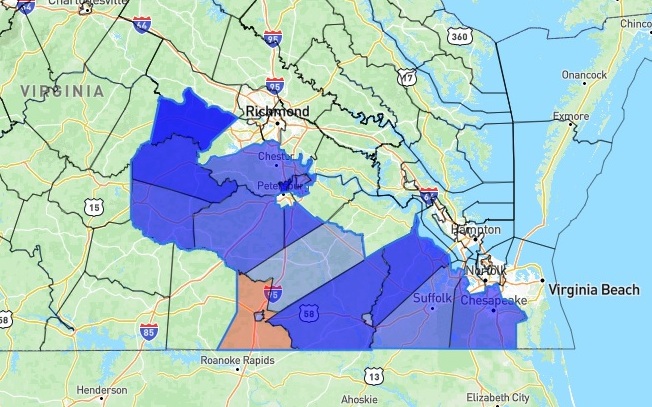
VA-4 results in 2014 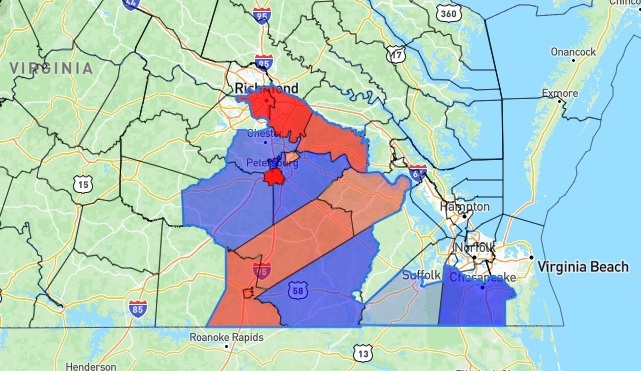
VA-4 results in 2016
The goal of the gerrymander was to obliterate the 4th district as previously drawn (see above maps), and cause it to expel a White Republican incumbent (Randy Forbes) and replace him with a black Democrat. This was easily accomplished. However a side effect was to significantly alter Brat's 7th district, much to his detriment, as you can see from the following maps.

VA-7 results in 2014 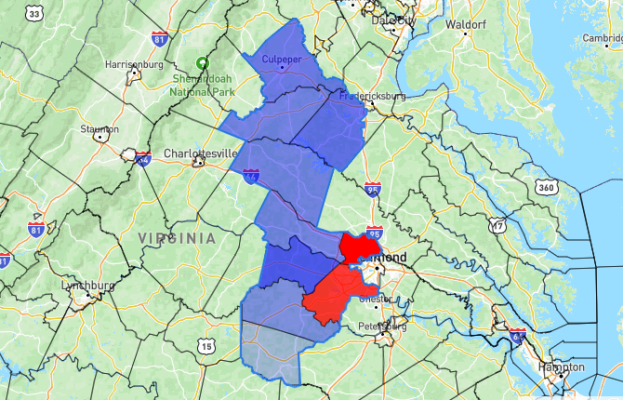
VA-7 results in 2018
Bad areas of Chesterfield and Henrico counties in the Richmond suburbs were added to VA-7, causing their proportion of the district vote to increase to around 60% from 50%. Brat still won in 2016 fairly easily, but with a margin (15 points) that was noticeably down from what it had been in 2014 (24 points). Prior to redistricting CD-7 was rated as R+10; after redistricting it was closer to R+2. Then came the 2018 election, the district flipped from blue to red (proper color usage) where it has remained, and Brat was finished. Democrats were happy; the GOPe was elated.

Photo credit: David Zalubowski /AP
In Colorado, Lauren Boebert took the first successful step in her bid for re-election in her new district (CD-4) as she easily defeated 5 other Republicans in the June 25th primary. Boebert, the current incumbent in CD-3, did not run in the special CD-4 election to replace Ken Buck, the formerly righteous conservative who ran shrieking to the left and exited a few months ago in order to hamstring the narrow GOP House majority even further than it already was.
Federal Election Commission reports concerning Colorado's 3rd district show that something called the "Rocky Mountain Values" PAC spent nearly $200K against conservative Ron Hanks, who was able to raise only $22,000 himself to fight back against the liberals -- Democrats and Republicans -- who supported his main primary opponent, moderate-liberal lawyer Jeffrey Hurd. The left-wing media claims that Rocky Mountain Values actually spent $500,000, and that the funds were spent supporting Hanks, because the PAC calculated that the conservative would be easier to beat in November. This Democrat PAC exists for the sole purpose of collecting and spending money to manipulate Republican primary outcomes in Colorado, one way or the other. He could have had an impact, but Donald Trump was silent in the CD-3 primary race and avoided endorsing the conservative; probably because that woefully-underfunded conservative was likely to lose the primary anyway. Which he did, by about 13 points in a 6-way race; current figures show Hurd as the winner with 41.3%, to 28.5% for Hanks. This is not the first time Democrats have openly tried to sabotage Republican primaries in Colorado. In numerous states in 2022, Democrats cleared the field for their chosen candidates in winnable statewide elections, thereby averting needlessly expensive and divisive primaries. That tactic also frees up Democrat voters who, because they have no real contests of their own to vote in, are able to cross over and manipulate the outcome of GOP primaries. Colorado state law even allows "independent" voters to participate in Republican primary elections without having to bother to re-register (no matter how temporarily) as Republicans. In 2022, only in the Pennsylvania Senate race (among all truly contested two-party races for Governor or Senate in the entire country) did Democrats allow the possibility of an acrimonious primary election. But it never happened because all of the party's heavyweights -- and their money -- were on the side of radical leftist candidate John Fetterman instead of the slightly less liberal candidate, Conor Lamb. Lambykins was never close in any primary poll, usually not even within 20-30 points of Fetterman, so there was never any doubt as to who the winner would be and the puppetmasters could afford to let the voters appear to "decide" that election. It's more of the same in 2024, where Democrats have once again cleared the field in every primary election where it matters, while Republicans still regularly wage war against each other in their primaries. On the GOP side the primary winner is often mortally wounded heading into the general election, and the RINOs refuse to unite with the conservatives whenever the primary voters have the temerity to select the less liberal candidate. In no state were liberal manipulations of GOP primaries more blatant than in Colorado in 2022. Democrats, often uniting with anti-conservative Republicans, spent inordinate amounts of money to get their way. In CD-3 in 2022, Democrats pulled out all the stops to either defeat or severely injure Lauren Boebert in her primary election against RINO Don Coram. They failed to defeat her at that time, but they were able to inflict sufficient damage which -- combined with the vast amount spent by liberal Aspen Democrat Adam Frisch, including over $2 million of his own money -- almost got the job done in November. Boebert narrowly escaped with a 50.1% to 49.9% win. Frisch spent over $6 million in all in 2022, which is chump change compared to what he and the Rats are spending in one more attempt to buy this congressional seat in 2024. Though failing in CD-3 in 2022, Democrats did get the outcomes they wanted in the more important Governor and Senate elections in Colorado, not to mention the really important Secretary of State election. Though it is not clear why they felt the need to go to so much trouble influencing Republican primaries for offices which the Democrats were always highly likely to win regardless of who the GOP nominee turned out to be. In the gubernatorial and senatorial Republican primary races, big-money Democrats funneled lots of $$$$ to the more conservative GOP candidates with the idea that they would be easier to defeat in a general election. The conservative who was running for Governor, Greg Lopez, was defeated in that primary by liberal Republican Heidi Ganahl, who was obliterated by almost 20 points by the incumbent Democrat rump-ranger in November. Lopez was elected to Congress last week in the special election in Colorado's 4th congressional district. His tenure in the House will be brief, as he did not choose to run for the full term which begins in 2025. In the 2022 GOP Senate primary, the puppetmasters feared squishy Republican Joe O'Dea and tried to boost Ron Hanks -- the same Ron Hanks who ran in the 2024 primary in CD-3. Once again the string-pullers failed to drag the conservative across the finish line, but they need not have feared O'Dea -- he lost by over two touchdowns in November to the incumbent liberal Democrat. But not before those same puppetmasters invested over $16 million dollars in "independent" expenditures against O'Dea; O'Dea himself was only able to raise $10 million altogether and $4 million of that came out of his own pocket. He never had a chance, though GOP leaders talked bravely (and stupidly) about supporting him with money -- however little that amount was, it would have been much better spent on Senate races practically anywhere else, like Georgia, Arizona or Pennsylvania. The biggest liberal coup of all in Colorado in 2022 was capturing the vital Secretary of State office, which is the office in charge of counting votes and abetting Democrat vote fraud (and helping persecute those who call it out). The GOP primary in that race was quite mysterious: How Did A Zuckerberg Charity Stooge Win A GOP Primary In Colorado? Subtitle: "Pam Anderson won a race with no money and very few visible voters". 
Photo credit: NY Post
On June 25, Jamaal "Fire Chief" Bowman (D-NY) was soundly defeated in the Democrat primary in New York's 16th congressional district by Westchester County executive George Latimer (D-Israel). Bowman thus becomes the first member of the radical leftist Democrat coven known as "The Squad" to be defeated in a re-election bid.
Fire Chief Bowman falsely claimed that he turned in the alarm because he was trying to open emergency doors so he could hustle to the important vote which was taking place elsewhere in the Capitol building -- a phony fire alarm is more dangerous than any alleged "crime" committed by the J6 political prisoners. Bowman was facing a six-month jail term for this stunt, but charges were quickly dropped by Washington D.C. authorities (go figure). The House Ethics Committee, which is led by GOP milquetoasts, also immediately declined to recommend any punishment for Bowman. New York's 16th district was rated by Charlie Cook as D+25 in 2020 and D+20 after redistricting reduced the Bronx portion of the district to practically nothing; CD-16 is now contained almost entirely (~95%) within suburban Westchester County and remains utterly safe for Democrats. The new Democrat congressman from CD-16 will be just as liberal as Bowman, so don't expect any improvement there; he probably won't be as obnoxious, though. 
Westchester County, NY
People who get their demographic information from television sitcom reruns may believe that Westchester County is a bastion of upscale White Republicans in a bucolic setting of well-manicured lawns and endless golf courses. To them, it must be confusing that such an area would have elected and then re-elected a black racist who is one of the most far-left Democrats in the entire House.

Photo credit: Bettmann Archive
In the early 1960's, Hollywood ultra-liberal Carl Reiner placed the main character's home in New Rochelle in "The Dick Van Dyke Show". A decade later, Hollywood ultra-liberal Norman Lear created a spinoff of "All in the Family" based around the strident liberal character of Maude Findlay. The show, called "Maude", was set in the village of Tuckahoe. 
Photo credit: YouTube
When Rob and Laura Petrie and their son Richie were living in Westchester County in their early 60's sitcom world, the county was over 90% White and gladly voted for Republicans -- albeit liberal Republicans. Westchester's influence in New York elections peaked in Maude's 1970's, at which time demographic deterioration was picking up speed as refugees from New York City invaded in larger numbers. This naturally caused many of the good people of the county to flee to more distant places such as the Hudson Valley, further Upstate, or Florida, the mass exodus serving to push Westchester further left.
Tags:
2024
U.S. House
Virginia
Colorado
New York
| |||||||||||||||||||||||||||||||||||||||||||||||||||||||||||||||||||||||||||||||||||||||||||||||||||||||||||||||||||||||||||||||||||||||||||||||||||||||||||||||||||||||||||||||||||||||||||||||||||||||||||||||||||||||||||||||||||||||||||||||||||||||||||||||||||||||||||||||||||||||||||||||||||||||||||||||||||||||||||||||||||||||||||||||||||||||||||||||||||||||||||||||||||||||||||||||||||||||||||||||||||||||||||||||||||||||||||||||||||||||||||||||||||||||||||||||||||||||||||||||||||||||||||||||||||||||||||||||||||||||||||||||||||||||||||||||||||||||||||||||||||||||||||||||||||||||||||||||||||||||||||||||||||||||||||||||||||||||||||||||||||||||||||||||||||||||||||||||||||||||||||||||||||||||||||||||||||||||||||||||||||||||||||||||||||||||||||||||||||||||||||||||||||||||||||||||||||||||||||||||||||||||||||||||||||||||||||||||||||||||||||||||||||||||||||||||||||||||||||||||||||||||||||||||||||||||||||||||||||||||||||||||||||||||||||||||||||||||||||||||||||||||||||||||||||||||||||||||||||||||
| 6/13/2024: This Week's Primaries; Meltdown in Maine; The Last Sane Senate Democrat? [RightDataUSA] | |||||||||||||||||||||||||||||||||||||||||||||||||||||||||||||||||||||||||||||||||||||||||||||||||||||||||||||||||||||||||||||||||||||||||||||||||||||||||||||||||||||||||||||||||||||||||||||||||||||||||||||||||||||||||||||||||||||||||||||||||||||||||||||||||||||||||||||||||||||||||||||||||||||||||||||||||||||||||||||||||||||||||||||||||||||||||||||||||||||||||||||||||||||||||||||||||||||||||||||||||||||||||||||||||||||||||||||||||||||||||||||||||||||||||||||||||||||||||||||||||||||||||||||||||||||||||||||||||||||||||||||||||||||||||||||||||||||||||||||||||||||||||||||||||||||||||||||||||||||||||||||||||||||||||||||||||||||||||||||||||||||||||||||||||||||||||||||||||||||||||||||||||||||||||||||||||||||||||||||||||||||||||||||||||||||||||||||||||||||||||||||||||||||||||||||||||||||||||||||||||||||||||||||||||||||||||||||||||||||||||||||||||||||||||||||||||||||||||||||||||||||||||||||||||||||||||||||||||||||||||||||||||||||||||||||||||||||||||||||||||||||||||||||||||||||||||||||||||||||||

Photo credit: WFMJ
Although Republican Michael Rulli easily won (54.6% to 45.3%) Tuesday's special election in Ohio's 6th congressional district over Democrat Michael Kripchak, media liberals are gloating about the Democrat's "moral victory", which is something they do in every special election where their candidate isn't completely blown out of the water by the voters.
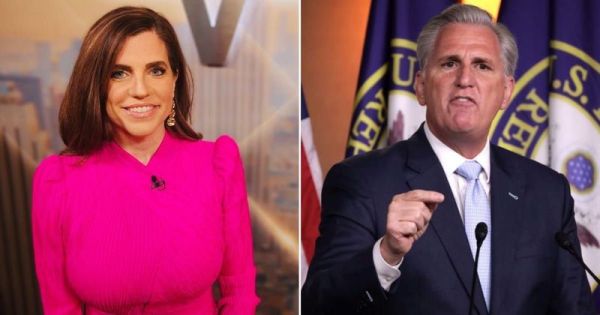
Photo credit: Nancy Mace/Youtube, Getty Images
Nancy Mace 1, Kevin McCarthy 0: In South Carolina, embattled Nancy Mace had an easier than expected time defeating Catherine Templeton, who was a sock puppet for disgraced ex-House Speaker Kevin McCarthy. Mace received approximately 57% of the Republican primary vote and thus easily avoided the runoff election which would have been necessary if she had failed to achieve 50%.
C.I.V.O. -- "Conservative In Voting Only": Elsewhere in the Palmetto State on Tuesday, incumbent Republican William Timmons in CD-4 (Greenville/Spartanburg) barely survived a primary challenge from his right, just as he had barely survived a similar but less focused threat two years earlier. In this heavily Republican district, a primary win is often tantamount to election because Democrats either do not field any candidate at all, or they make only the smallest token effort. Timmons, now completing his third term in Congress, has displayed conservative tendencies when voting on legislation. The American Conservative Union gives Timmons a lifetime rating of over 90% and he toes the party line (such as that party line sometimes is) at least 95% of the time; he cannot technically be called a "RINO". On the other hand, there is more to a congressman than how he votes. Given his vastly underwhelming performance in primary elections lately, it is clear that Timmons has done something to annoy a sizable portion of his party's base. Among other reasons for annoyance, Timmons is definitely not a "fighter" for conservative causes. Timmons was a staunch supporter of disgraced ex-House Speaker Kevin McCarthy and, as a go-along-to-get-along type, would hardly be uncomfortable as a Republican back-bencher in a Democrat-controlled House. Which is something he may well get to see first-hand in 2025. Timmons has rejected calls to join the House Freedom Caucus, that "far-right" group of conservatives who dare to try to influence legislation (gasp!); they also try to influence the moderate House leadership, of which they comprise no part. In order to avert retaliation (which shows you how the GOPe works) the membership list of the House Freedom Caucus is never disclosed. Timmons proudly declares that he is not now nor has he ever been a member of that group, and he also complains that the Caucus is a hindrance to getting certain (liberal) legislation through the House. Timmons has some other issues (extramarital affairs, support for racist DEI crap) which bolster the assertion that he is not worthy of re-election. In this year's CD-4 primary, unabashed Freedom Caucus member Matt Gaetz of Florida threw his support behind conservative state legislator Adam Morgan; Donald Trump, in an action so typical as to practically be mandatory, threw his support behind the wimpy incumbent even though there was no risk whatsoever of the conservative Morgan losing to a Democrat in November. [The same thing applied in the North Dakota U.S. House race, where Trump bypassed solid conservative Rich Becker in order to endorse a likely RINO in a district which had no incumbent running -- and, like in SC-4, no viable Democrat opposition in November either.] The South Carolina squish eked out a win on Tuesday, with 51.6% to 48.4% for Morgan. Timmons raised and spent nearly $2 million, although $900,000 of that came from a loan which Timmons was able to make to his campaign. Morgan actually outraised the incumbent swamp critter in terms of individual mom-n-pop type contributions, while Timmons had much greater support from the political/corporate sector, and his own bank account. 
Photo credit: Alchetron
The focus in Maine was on the winnable second congressional district which has been held by Democrat Jared Golden since his surprising "Rigged Choice Voting" victory in 2018. Maine voters (mostly Democrats) had just approved a ballot initiative implementing the RCV scheme which took effect in 2018, and those Democrats were delighted when Golden defeated incumbent moderate Republican Bruce Poliquin thanks solely to the provisions of Rigged Choice Voting; without that, Poliquin was the winner.
Andrews' "resignation" was merely symbolic and utterly meaningless seeing as how the Maine legislature has already adjourned for the year and Andrews was not running for re-election anyway. He did not elaborate on what the real problem was here, but it's probably spelled T-r-u-m-p. However, like Soboleski, Andrews is also normally a conservative and his voting record backed up that description. It is therefore possible that Trump wasn't the main point of contention. In every story about this 27,000 square-mile district, the liberal media makes sure to note that it was once the site of a "mass shooting"; Theriault is a supporter of the Second Amendment, which according to the media (and probably John Andrews) makes Theriault somehow personally responsible for that massacre. Golden's financial advantages and his experience with manipulating the voters of the second district will be difficult to overcome, but the GOP has put this House seat at or near the top of its list of potential pickups, and for good reason. An R+6 district is likely to come to its senses sooner or later, and 2024 may be the year that happens. 
Photo credit: New York Times
In the Senate primary in Nevada, Trump-anointed Sam Brown, a moderate Republican, breezed past conservative challenger Jeff Gunter. Gunter was appointed as Ambassador to Iceland by Trump, but the ex-President typically opted for the "electable" moderate in this race instead of the true conservative. Pre-primary polls had indicated a potentially close finish between Brown and Gunter, but the current figures show 59.8% for Brown and only 15.1% for runner-up Gunter.

Photo credit: Gateway Pundit
Speaking of squishy (or far worse) Senators: Lately we have been subjected to numerous articles in the "right-wing" media which have awarded Strange New Respect to drooling Pennsylvania Democrat John Fetterman. Fetterman, of course, is the combination of the characters of Lurch and Uncle Fester from the old Addams Family television show, and this cartoon character has been a U.S. Senator since defeating Electable Dr. Oz in 2022.
Tags:
2024
U.S. House
Senate
Ohio
South Carolina
Nevada
Maine
Lurch / Uncle Fester
| |||||||||||||||||||||||||||||||||||||||||||||||||||||||||||||||||||||||||||||||||||||||||||||||||||||||||||||||||||||||||||||||||||||||||||||||||||||||||||||||||||||||||||||||||||||||||||||||||||||||||||||||||||||||||||||||||||||||||||||||||||||||||||||||||||||||||||||||||||||||||||||||||||||||||||||||||||||||||||||||||||||||||||||||||||||||||||||||||||||||||||||||||||||||||||||||||||||||||||||||||||||||||||||||||||||||||||||||||||||||||||||||||||||||||||||||||||||||||||||||||||||||||||||||||||||||||||||||||||||||||||||||||||||||||||||||||||||||||||||||||||||||||||||||||||||||||||||||||||||||||||||||||||||||||||||||||||||||||||||||||||||||||||||||||||||||||||||||||||||||||||||||||||||||||||||||||||||||||||||||||||||||||||||||||||||||||||||||||||||||||||||||||||||||||||||||||||||||||||||||||||||||||||||||||||||||||||||||||||||||||||||||||||||||||||||||||||||||||||||||||||||||||||||||||||||||||||||||||||||||||||||||||||||||||||||||||||||||||||||||||||||||||||||||||||||||||||||||||||||||
| 6/10/2024: [South Carolina] Who Are You, and What Have You Done With Nancy Mace? [RightDataUSA] | |||||||||||||||||||||||||||||||||||||||||||||||||||||||||||||||||||||||||||||||||||||||||||||||||||||||||||||||||||||||||||||||||||||||||||||||||||||||||||||||||||||||||||||||||||||||||||||||||||||||||||||||||||||||||||||||||||||||||||||||||||||||||||||||||||||||||||||||||||||||||||||||||||||||||||||||||||||||||||||||||||||||||||||||||||||||||||||||||||||||||||||||||||||||||||||||||||||||||||||||||||||||||||||||||||||||||||||||||||||||||||||||||||||||||||||||||||||||||||||||||||||||||||||||||||||||||||||||||||||||||||||||||||||||||||||||||||||||||||||||||||||||||||||||||||||||||||||||||||||||||||||||||||||||||||||||||||||||||||||||||||||||||||||||||||||||||||||||||||||||||||||||||||||||||||||||||||||||||||||||||||||||||||||||||||||||||||||||||||||||||||||||||||||||||||||||||||||||||||||||||||||||||||||||||||||||||||||||||||||||||||||||||||||||||||||||||||||||||||||||||||||||||||||||||||||||||||||||||||||||||||||||||||||||||||||||||||||||||||||||||||||||||||||||||||||||||||||||||||||||

Three high-profile primaries in U.S. House districts will be held tomorrow in South Carolina. In solidly Republican CD-3 (Anderson and the northwest portion of the state), seven candidates are vying to replace 7-term conservative Jeff Duncan, who is retiring rather than face a campaign that would feature nasty (and unproven) allegations from his vindictive soon-to-be ex-wife. In solidly Republican CD-4 (Greenville/Spartanburg) Trump-supported incumbent William Timmons is facing conservative state legislator Adam Morgan, who is being boosted by outspoken conservative congressman Matt Gaetz of Florida. Timmons had no Democrat opposition in 2022 but he achieved only 52.7% in a four-way primary that year, and this one could be close too.
The Charleston-based district has been quite volatile politically in recent years. When the voters of this district sent Republican Mark Sanford back to Congress for a second stint in a 2013 special election, it appeared that they had forgiven him for his erratic behavior including (but not limited to) his Kennedy-esque extramarital affairs, his sudden unexplained disappearance while Governor in 2009, and his surprising reappearance in Argentina several days later. Sanford compiled a generally conservative record throughout most of that second stint in the House. In 2018 however, Sanford split with President Trump and ran shrieking to the left, opposing Trump on nearly 50% of his House votes that year. Trump endorsed Katie Arrington, a mostly moderate state legislator, in the 2018 GOP primary against Sanford. Arrington won that primary by the margin of 50.6% to 46.5%, narrowly averting a runoff. In the 2018 general election, Cunningham and the Democrats outstpent Arrington by 50%, while the GOP establishment abandoned Arrington when they weren't busy knifing her in the back; she had to finance a significant portion of her own campaign. Arrington lost by just over 1% in November. Arrington would be heard from again, but not in 2020 when the Republicans united behind Nancy Mace. Mace, who had compiled a moderate-to-slightly-conservative record during her three years in the SC state House, recaptured CD-1 for the Republicans by about the same narrow margin which Arrington had lost it two years earlier. The Democrats spent over $7 million trying to keep Cunningham in office, plus another $6 million in "independent" expenditures opposing Mace. But the GOP fought back and was able to compete on almost equal financial footing in the 2020 campaign. Mace evicted Cunningham from the House even as Trump's margin in CD-1 was falling from 13% in 2016 to only 6% in 2020. CD-1 was redistricted to be slightly more Republican after 2020, a pertinent factor which will be addressed below. Mace was no conservative during her first three years in Congress, and she became a self-appointed poster child for her wing of the GOP. She regularly ran to the liberal media and criticized her conservative colleagues, and others on the right, for their attacks on "RINOs" and she warned that such attacks would severely damage the party at the polls. Mace, who according to her bio played a substantial role in the Trump campaign in 2016 in South Carolina, eventually broke with the former President. It didn't help matters when she said Trump was "accountable" for the so-called "attack" on the U.S. Capitol building on January 6, 2021. In the 2022 Republican primary, Trump and the conservatives threw their weight behind Arrington, who was making her second bid for the CD-1 seat. The right did claim a scalp in the 2022 South Carolina primary, that of Trump impeachment RINO Tom Rice in CD-7, but Mace survived without a runoff when Arrington came up several points short. Democrats only tepidly contested this seat in November of 2022, and Mace easily won the R+7 district. As recently as last year Mace was still being her usual irritating moderate self.... and then something odd happened. 
Photo credit: J. Scott Applewhite / Associated Press
In October of 2023 Mace was part of a small cabal of GOP representatives who voted to remove Assistant Democrat Kevin McCarthy as Speaker. Who knew at the time that Mike "Pence" Johnson would be just as craven and cowardly?
Nobody is suggesting that a politician who sticks her finger into the wind and changes course accordingly is to be respected or trusted. But that's not what Nancy Mace did here, opinions of the haters notwithstanding. We mentioned redistricting earlier in this commentary. For all of 2023 and most of 2024 there was every reason to believe that Mace's district would be altered again and moved sharply to the left, in a racist effort to favor Democrats. Her move to the right under those circumstances would hardly constitute "blowing with the wind". If anything, in order to be re-elected she would need to run away from anything resembling conservatism in order to attract Democrat votes. Only a few short weeks ago did Mace get a reprieve. On May 23 the U.S. Supreme Court rejected the arguments of the professional racists at the NAACP. They ruled that South Carolina does not need to redistrict again and gerrymander Mace's congressional district to make it solidly Democrat. We not only need more conservatives in Congress, we need more conservative fighters. Mace has always been aggressive, and now that she is finally fighting the GOOD fight, we strongly support her re-election bid and all conservatives should do so as well. Addendum: Mace's main financial opposition -- to the tune of 2 million dollars for the June 11 primary alone -- is something called "South Carolina Patriots PAC" which just sprung into existence a few months ago for the express purpose of torpedoing Mace. It has contributed to no other races in the state, or anywhere else. It's being funded by McCarthy's millionaire allies in order to give the coward some "plausible deniability". McCarthy has apparently only contributed a token amount of the money he bilked his own contributors out of, for the alleged purpose of financing his own re-election which of course isn't happening. If you like dark-money GOP establishment RINO puppets, you'll love Catherine Templeton. Tags:
2024
U.S. House
South Carolina
People DO Change
| |||||||||||||||||||||||||||||||||||||||||||||||||||||||||||||||||||||||||||||||||||||||||||||||||||||||||||||||||||||||||||||||||||||||||||||||||||||||||||||||||||||||||||||||||||||||||||||||||||||||||||||||||||||||||||||||||||||||||||||||||||||||||||||||||||||||||||||||||||||||||||||||||||||||||||||||||||||||||||||||||||||||||||||||||||||||||||||||||||||||||||||||||||||||||||||||||||||||||||||||||||||||||||||||||||||||||||||||||||||||||||||||||||||||||||||||||||||||||||||||||||||||||||||||||||||||||||||||||||||||||||||||||||||||||||||||||||||||||||||||||||||||||||||||||||||||||||||||||||||||||||||||||||||||||||||||||||||||||||||||||||||||||||||||||||||||||||||||||||||||||||||||||||||||||||||||||||||||||||||||||||||||||||||||||||||||||||||||||||||||||||||||||||||||||||||||||||||||||||||||||||||||||||||||||||||||||||||||||||||||||||||||||||||||||||||||||||||||||||||||||||||||||||||||||||||||||||||||||||||||||||||||||||||||||||||||||||||||||||||||||||||||||||||||||||||||||||||||||||||||
| 6/6/2024: Incumbent House Democrats: Running Scared or Just Faking Toward the Center? [RightDataUSA] | |||||||||||||||||||||||||||||||||||||||||||||||||||||||||||||||||||||||||||||||||||||||||||||||||||||||||||||||||||||||||||||||||||||||||||||||||||||||||||||||||||||||||||||||||||||||||||||||||||||||||||||||||||||||||||||||||||||||||||||||||||||||||||||||||||||||||||||||||||||||||||||||||||||||||||||||||||||||||||||||||||||||||||||||||||||||||||||||||||||||||||||||||||||||||||||||||||||||||||||||||||||||||||||||||||||||||||||||||||||||||||||||||||||||||||||||||||||||||||||||||||||||||||||||||||||||||||||||||||||||||||||||||||||||||||||||||||||||||||||||||||||||||||||||||||||||||||||||||||||||||||||||||||||||||||||||||||||||||||||||||||||||||||||||||||||||||||||||||||||||||||||||||||||||||||||||||||||||||||||||||||||||||||||||||||||||||||||||||||||||||||||||||||||||||||||||||||||||||||||||||||||||||||||||||||||||||||||||||||||||||||||||||||||||||||||||||||||||||||||||||||||||||||||||||||||||||||||||||||||||||||||||||||||||||||||||||||||||||||||||||||||||||||||||||||||||||||||||||||||||

It's both, but mainly the latter.
Now we are in an election year, and even though most voters don't have any clue who their representative in Congress is until they see an election ballot -- and they certainly have no idea how that congressman votes -- incumbents are wary of their congressional voting record being used against them in the campaign, and so they often try to "moderate" their record to avoid accusations of extremism. The vast majority of the time, it is Republicans who must be the most wary and who do the most moderating. The liberal media, and of course Democrat candidates and RINOs who are running to an incumbent's left in a primary, will gladly use whatever ammunition is available against a conservative. It is a rare case that a liberal Democrat -- even in the most marginal of districts -- must concern herself even slightly about charges of being "too liberal". That is true in nearly all election years. But apparently not 2024. Our analysis of congressional voting data from Voteview which runs through May 23 shows that numerous Democrats are the ones who are panicking and running hysterically towards the center, while even the squishiest House Republicans suddenly have grown at least a small amount of backbone and are standing united most of the time. This behavior, on both sides, is unprecedented in recent years. With all of these "moderate" Democrats voting alongside the solid Republican majority so frequently, why isn't more conservative legislation becoming law? There are at least two reasons. First, these Democrat defections are carefully metered by the party leadership. A certain group of panicky Democrats is permitted to leave the plantation on a particular vote, then a different group is given temporary freedom on a subsequent vote, and so on. No specific bill which is repugnant to liberals has any landslide vote in favor of it. Secondly, even if one does slip past them in the House, the Democrats still have their firewall in the Senate where any conservative bill is D.O.A. Despite only 49 actual Democrats plus two alleged independents, Angus King & Kyrsten Sinema, they effectively have at least 53 fairly solid votes (see below) against any legislation that could be remotely described as conservative. So these center-fakes are basically a no-risk venture from the perspective of the liberal Democrat House leadership, and there is a significant benefit to playing the voting equivalent of Three-Card Monte: the supposedly endangered House Democrats get vital "moderate cred" for these carefully choreographed votes, which they can use to deflect accusations of ultra-liberalism that may arise on the campaign trail. No vulnerable Democrat wants to hear her Republican opponent declare "She voted with Hakeem Jeffries 94% of the time!" during a debate or at any other time during a campaign. These tactical departures from lockstep Democrat voting are meant to defuse such allegations and to create the illusion of independence from the unpopular liberal leadership. In 2024 five Democrats have been voting nearly as much (over 40%) with Republicans on Party Unity votes than they vote with their own party. Another 22 Democrats have been allowed to leave the plantation at least 25% of the time. Twenty-five percent may not sound like a lot, but for Democrats in recent years it is a ton. In 2023 only one Democrat (Jared Golden) rather than 27 reached that threshold of permissible disobedience. In 2022, the last time these people had to face the voters, Democrats were as united as ever with not even one of them dissenting from party orthodoxy as much as 20% of the time. In 2024, fully 48 Democrats have exceeded that figure so far. The fact that they feel the need to fake to the center so often is an indication that panic is setting in. The column titled "% GOP" in the table below is the percentage of the time so far in 2024 that the Democrat representative has voted with the Republicans on Party Unity votes. Freshmen are shown in italics; the first re-election bid is normally the toughest.
Notes:

Photo credit: ABC News
There is no such phenomenon in the Senate of Democrats feeling the need to fake to the center. The most (allegedly) endangered Senate Democrats are remaining on the far left, and not even glancing toward the center much less moving in that direction. Their scores on Party Unity votes:

Photo credit: womenzmag.com
On the other hand, the usual Republican suspects -- who are not even up for re-election this year so we're stuck with them -- are still cheerfully voting with the Democrats and against their own party a significant portion of the time:
Even if the Republicans regain numerical control of the Senate as a result of November's elections (they need only a Trump win or one additional victory besides West Virginia in a Senate race), who can possibly believe the GOP will have actual control with traitors like Collins and Murkowski in their ranks? If necessary, one or both of those desiccated crones may bolt the party and claim to be Independent in order to stop Republicans from having even numerical control. Even the execrable Mitt Romney, who is retiring after 2024 and undoubtedly wishes to end his political career in a blaze of anti-conservative glory, only votes with the Democrats 24% of the time so far this year. The Democrat analog to Romney is Joe Manchin, who recently announced his departure from the Democrat party to become an independent. Like Romney and fellow "independent" Kyrsten Sinema, Manchin is never going to face the voters of his state again and can therefore follow his conscience from here on out. Be that as it may, Manchin's conscience is still somewhere around 75% liberal, and he still has to answer to the party masters who will not appreciate his defection on any bills which are truly important to them. The comparison of Manchin to Romney is not completely appropriate though both enjoy the notoriety they sometimes receive for being a thorn in the side of their respective parties. Manchin, unlike Romney, is not a regular visitor to liberal media opinion programs (sometimes disguised as "news") to trash his own party whenever possible. Romney's propaganda value to the left is far greater than his mere voting record in the Senate; Manchin is also a whore for publicity, but his damage to the Democrat party has always been minimal and that's not going to change despite the fact that he has altered his party label for his final few months in office. Conclusion: Although House Democrats appear to be running scared it's likely just so much political theater. Nearly all of the most vulnerable ones still have sizable money, organizational and of course media advantages over their GOP challengers. On the flip side, the numerous vulnerable Republican House incumbents may be sticking together in terms of votes in Congress, but their chances for re-election will be determined more by money and voter turnout and factors which affect that (such as election "integrity") than those votes in the House. In many instances, that's not a happy prospect. Tags:
2024
U.S. House
Scared Democrats?
Fakers
| |||||||||||||||||||||||||||||||||||||||||||||||||||||||||||||||||||||||||||||||||||||||||||||||||||||||||||||||||||||||||||||||||||||||||||||||||||||||||||||||||||||||||||||||||||||||||||||||||||||||||||||||||||||||||||||||||||||||||||||||||||||||||||||||||||||||||||||||||||||||||||||||||||||||||||||||||||||||||||||||||||||||||||||||||||||||||||||||||||||||||||||||||||||||||||||||||||||||||||||||||||||||||||||||||||||||||||||||||||||||||||||||||||||||||||||||||||||||||||||||||||||||||||||||||||||||||||||||||||||||||||||||||||||||||||||||||||||||||||||||||||||||||||||||||||||||||||||||||||||||||||||||||||||||||||||||||||||||||||||||||||||||||||||||||||||||||||||||||||||||||||||||||||||||||||||||||||||||||||||||||||||||||||||||||||||||||||||||||||||||||||||||||||||||||||||||||||||||||||||||||||||||||||||||||||||||||||||||||||||||||||||||||||||||||||||||||||||||||||||||||||||||||||||||||||||||||||||||||||||||||||||||||||||||||||||||||||||||||||||||||||||||||||||||||||||||||||||||||||||||
| 5/16/2024: Mid-May Primary Wrap-Up [RightDataUSA] | |||||||||||||||||||||||||||||||||||||||||||||||||||||||||||||||||||||||||||||||||||||||||||||||||||||||||||||||||||||||||||||||||||||||||||||||||||||||||||||||||||||||||||||||||||||||||||||||||||||||||||||||||||||||||||||||||||||||||||||||||||||||||||||||||||||||||||||||||||||||||||||||||||||||||||||||||||||||||||||||||||||||||||||||||||||||||||||||||||||||||||||||||||||||||||||||||||||||||||||||||||||||||||||||||||||||||||||||||||||||||||||||||||||||||||||||||||||||||||||||||||||||||||||||||||||||||||||||||||||||||||||||||||||||||||||||||||||||||||||||||||||||||||||||||||||||||||||||||||||||||||||||||||||||||||||||||||||||||||||||||||||||||||||||||||||||||||||||||||||||||||||||||||||||||||||||||||||||||||||||||||||||||||||||||||||||||||||||||||||||||||||||||||||||||||||||||||||||||||||||||||||||||||||||||||||||||||||||||||||||||||||||||||||||||||||||||||||||||||||||||||||||||||||||||||||||||||||||||||||||||||||||||||||||||||||||||||||||||||||||||||||||||||||||||||||||||||||||||||||||

Photo credit: Mike Braun For Indiana
In the state of Indiana on May 7, the Republican primaries all went as expected although one outcome was successfully influenced by a considerable amount of out-of-state money being spent by single-issue groups in order to defeat a certain GOP candidate.

Photo credit: AIPAC
In CD-8, ex-Congressman John Hostettler was trying to reclaim the seat he lost 18 years ago. Hostettler wasn't exactly a paragon of arch-conservatism during his time in Washington, but he was OK and he'd be better than state Senator Mark Messmer who at one time was a conservative but is now a total squish. Hostettler was branded as "anti-Jewish" and was opposed by the extremely wealthy Israel Lobby (groups such as the "Republican Jewish Coalition" and "United Democracy Project"). Over $2 million of their money went into this single U.S. House primary with the goal of electing the more liberal Republican. Messmer won with nearly 40% of the vote while Hostettler (who was endorsed by Rand Paul and Charlie Kirk) came up just short of 20% in the field of eight. Money talks, and in this contest it absolutely shrieked. One wonders just how much these particular special interest groups are spending to oust anti-Israel Democrats from Congress; there aren't any shortage of those, but these groups seem to be giving them a free pass.

In Maryland on May 14, liberal women swept the Democrat primaries for open seats in the U.S. Senate and House districts 3 and 6. We've already profiled the Senate contest, and as far as House races only the primary in CD-6 was of any significant interest to Republicans; it's their one slim chance of picking up a Democrat-held House seat in Maryland, where liberals currently occupy 7 of the 8 districts thanks in at least a couple of cases to hyper-partisan Democrat gerrymandering. CD-6 is the most gerrymandered of them all.

Photo credit: bacon.house.gov
Nebraska: the state-level GOP organization which, according to surely unbiased media reports, "was taken over by those loyal to former President Donald Trump during a contentious state convention" -- that happened back in 2022 -- decided to oppose (or ignore) all 5 of the Republican incumbents who were running for federal office. This is quite good since pretty much all 5 incumbents are squishes, but unfortunately the tactic proved to be utterly ineffective. For one thing, actions (especially $$$) speak far louder than words, and these were only words; the conservative challengers collectively had about $1.50 to work with here. Also, making the announcement regarding endorsements just moments before the voters had to head to the polls was a great way to make sure that as few people as possible got the message.
The NEGOP made no endorsement in the races involving Fischer and Flood, and they endorsed challengers to Ricketts, Bacon and Smith. All 5 incumbents did face primary opposition -- such as it was.
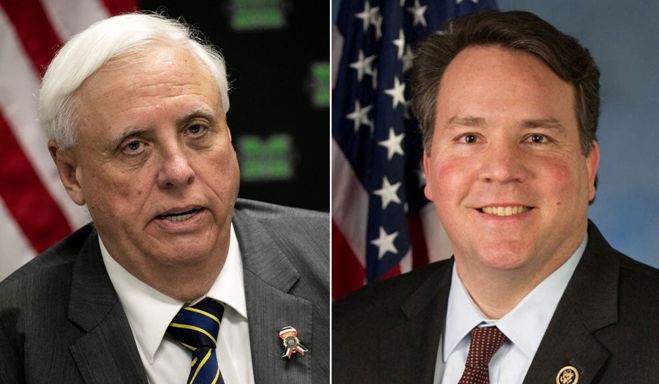
Photo credit: National Review
West Virginia, where energetic conservative Senate candidate Alex Mooney was swamped by doddering moderate Governor Jim Justice in Tuesday's Senate primary as was expected. "Terrifying and loathsome" is pretty much how the GOPe would describe Mooney. We'd describe him as "conservative". The GOPe would agree, and that's their main problem with the 5-term congressman.
It's fashionable for liberal elitists to refer to West Virginians using words like "hillbilly" and "inbred" because, to them, hatred of White people is always acceptable. Though we reject their racism, it must be conceded that West Virginia politics does sometimes have a certain inbred-type quality to it: In the CD-1 Republican primary, it was incumbent Carol Miller vs. former J6 political prisoner ("rioter", in biased liberal media parlance) Derrick Evans, age 39, who was briefly a state legislator before being forced to vacate the premises after his politically-motivated conviction in 2021. Miller, who won this primary with 63% of the vote, is a geriatric 73-year-old moderate currently in her third term in the House. She is the daughter of former conservative Ohio congressman Samuel Devine who was in Congress from 1959-1982. Miller's son, a car dealer by trade, was looking to extend the family's political dynasty by becoming Governor. However Chris Miller finished in third place in the 2024 GOP primary with about 20% of the vote and his political career is likely stillborn. Arch Moore, a moderate Republican like Jim Justice and Carol Miller, many moons ago had a long and legendary political career including 6 terms in the U.S. House and two distinct stints as Governor (he ran 5 times and won 3). Moore was first elected to office in 1952 and last ran in 1988 when he lost his bid for a fourth term as Governor. His daughter, Shelley Moore Capito, is a moderate-liberal Senate Republican and has been in Congress for nearly a quarter-century since being first elected to the House in 2000 in an upset victory over a megabucks Democrat trial lawyer who outspent her by a 6:1 margin. Justice's imminent elevation to the Senate in November will ensure that this solidly Republican state has two Republicans -- but no conservatives -- in that body for the first time since 1958. The last time West Virginia had two elected (as opposed to appointed) Republicans in the U.S. Senate was 93 years ago. Capito's son, former state legislator Moore Capito, ran for Governor this year and came in second to state Attorney General and former Senate candidate Patrick Morrisey in the GOP primary. The younger Capito compiled a somewhat conservative record as a member of the state House of Delegates from 2016-2023. Shelley Capito's nephew, state Treasurer Riley Moore (the true conservative politician in the family), won the 5-way primary to replace Alex Mooney in the U.S. House. After he wins the general election easily in November, it remains to be seen whether his voting record will be as conservative as expected. There's a good chance that he will at least start out that way, as many freshmen GOP legislators do. Tags:
2024
Indiana
Nebraska
West Virginia
Maryland
| |||||||||||||||||||||||||||||||||||||||||||||||||||||||||||||||||||||||||||||||||||||||||||||||||||||||||||||||||||||||||||||||||||||||||||||||||||||||||||||||||||||||||||||||||||||||||||||||||||||||||||||||||||||||||||||||||||||||||||||||||||||||||||||||||||||||||||||||||||||||||||||||||||||||||||||||||||||||||||||||||||||||||||||||||||||||||||||||||||||||||||||||||||||||||||||||||||||||||||||||||||||||||||||||||||||||||||||||||||||||||||||||||||||||||||||||||||||||||||||||||||||||||||||||||||||||||||||||||||||||||||||||||||||||||||||||||||||||||||||||||||||||||||||||||||||||||||||||||||||||||||||||||||||||||||||||||||||||||||||||||||||||||||||||||||||||||||||||||||||||||||||||||||||||||||||||||||||||||||||||||||||||||||||||||||||||||||||||||||||||||||||||||||||||||||||||||||||||||||||||||||||||||||||||||||||||||||||||||||||||||||||||||||||||||||||||||||||||||||||||||||||||||||||||||||||||||||||||||||||||||||||||||||||||||||||||||||||||||||||||||||||||||||||||||||||||||||||||||||||||


